

USA
By Alessia Sandala Assistant Editor
Four members of the shotgun team secured their places on Team USA following a selection match in Palm Beach, Florida, from Jan. 22 through Feb. 2.
Junior Jordan Sapp and sophomore Ava Downs made the open USA Shooting National Team, and junior Davis Hay and freshman Taylor Dale made the Junior National Team. They will compete abroad in International Shooting Sport Federation World Cup matches during the next few months.
“Just being able to share that moment with my teammates, my coach, and both my parents who came down for this match, was probably the best part,” Downs said. “My dad had to leave early. So, because my dad got me into shooting, my favorite part was when I got to call him and tell him that I made it. That was a really special moment for him and I.”
See Shotgun A10

Catholics chop wood for families in need
By Frederick Woodward Collegian Reporter
The Hillsdale College Catholic Society recently launched an initiative to provide free firewood for local residents.
The program aims to help low-income families heat their homes through the winter, according to Morgan Morrison ’21, the project’s coordinator.
Morrison serves as associate director of business and industry for Institutional Advancement at Hillsdale College and said the idea came to him on a road trip to Minnesota.
“There was a Catholic church in this little town called St. Boniface that had advertised a community firewood bank,” Morrison said. “It’s like the concept of a food bank, but with firewood being given away. I immediately thought Hillsdale could probably use one, because there are so many people around here that use firewood for fuel.”
Deputy Counsel for the college Neal Brady said Morrison reached out to him in advance
of the first project’s first wood cutting at Morrison’s farm on Feb. 8.
“Morgan got a hold of me through email and asked if I wanted to come by,” Brady said. “I brought a couple of good mauls and some chainsaws, and then we just went at it.”
Morrison said he kept the first cutting small for practical and safety reasons.
“We intentionally started with a small group, just to ensure safety,” Morrison said. “We had the two staff members running chainsaws while five or six students split and stacked wood, and everyone came out of it really enjoying it, wanting to do it again.”
Junior Nathan Fish was part of the initial group of students.
“It was my first time splitting wood,” Fish said. “There were a lot of guys there that were able to show me different techniques for splitting the wood, and they were able to give me a job that I was able to do. It was great coming out to serve the community.”
Fish said he would be inter-
ested in volunteering again.
“Being able to give glory to God through our volunteer hours and to work closely as brothers was great,” Fish said. “I would definitely take the opportunity to do that again.”
The religious aspect of the project is an important part of the equation for Brady.
“From a spiritual point of view, you’re not just providing people with wood,” Brady said. “You’re providing them with a means of warmth and heat and light, which is a spiritual gift as well. I think the whole idea is a natural fit for the Catholic Society.”
Morrison said he would like to expand the ministry further.
“I want to see it grow,” Morrison said. “I know it can, but we have several constraints. First is procurement of wood, and second is people to support us with our continued need for equipment. As a ministry of the Catholic Society, this effort is wholly nonprofit.”
See Wood A3
By Catherine Maxwell News Editor
Students should skip class if they feel sick as influenza and norovirus spread across campus, according to a Feb. 19 email from Director of Health Services Brock Lutz, who also told The Collegian that while he did not want to reveal specifics, the number of sick students has “certainly been higher than usual.”
“Something like this spreads pretty quickly, which is why we thought it would be helpful to send out an informational email,” Lutz said. “We wanted to make sure that people knew some of the signs, ways to practice preventative care, and important steps in case people do get sick.”
To prevent the viruses from spreading, Lutz said students should wash their hands frequently for at least 20 seconds, avoid touching their faces, and clean high-touch areas with bleach. To avoid norovirus, students should not prepare food for others if sick and should wash fruits and vegetables before eating, Lutz said in his email to campus.
Lutz said hydration is one of the most important ways sick students can take care of themselves because they lose so many fluids. Students should also rest and avoid common areas.
Norovirus, often called “stomach flu,” usually lasts one to three days and is contagious up to 48 hours after symptoms stop, the campus-wide email said. Its symptoms include nausea, vomiting, diarrhea, stomach pain, fever, body aches, and headaches.
Influenza can last from a couple days to two weeks, according to the U.S. Centers for Disease Control and Prevention. It is contagious from the onset of symptoms until 24 hours without a fever. Symptoms include sore throat, congestion, body aches, headaches, chills, cough, fever, and fatigue.
Although Health Services sent the email to provide more information about avoiding and treating the viruses, Lutz said students should not panic.
“While it is a challenging illness, it also seems to run its course pretty quickly, and so there is no reason to be overwhelmed by the prospect of getting sick,” Lutz said. Lutz said students should call Health Services if sick, especially with the stomach flu, to receive care instructions or set up an appointment with the nurse or doctor. In the campus-wide email, Lutz asked students to set up appointments instead of walking in to avoid exposure to others.
Todd Gerry, general manager of Hillsdale Dining, said Metz Culinary Management is aware of the situation.
“I assure you we will follow all guidelines set forth by state and local health departments,” Gerry said. “We plan to continue with the policies put in place and feel confident in keeping the food areas safe for anyone to enjoy the delicious meals prepared by the chefs.”
Lutz said housekeeping is also working to minimize virus transmission.
English majors give honors lectures
By Sophia Bryant Collegian Freelancer
By Elaine Kutas Collegian Reporter
The deans’ office released the first round of off-campus permissions Feb. 7, allowing about 100 upperclassmen and women off for next semester.
According to Dean of Women Rebekah Bollen, off-campus permissions are granted based on high school graduation year and credits accumulated at Hillsdale. Bollen said the process has been the same for many years to ensure that older students receive permission before younger students.
“We have not changed the policy at all,” Bollen said. “This is the standard process and procedure that we’ve been using for several years, and it’s what’s posted online when students apply for off-campus permission.”
According to the deans’ of-
fice, the number of off-campus spots changes year to year based on the number of anticipated graduating students, anticipated incoming students, and college-owned beds that need to be filled.
According to Dean of Men Aaron Petersen, the amount of college-owned housing has increased in recent years, leading to a decline in the number of permissions granted.
“The bottom line is that we added another women’s dorm, around 50 beds, and also the apartment units at the corner of Fayette and Hillsdale, which is about another 50 beds,” Petersen said. “We each were able to allow about 100 students off-campus for the coming year, which basically covers all the seniors.”
See Koon A2
Two senior English majors gave the Vade Mecum Honors Lectures for the English department Feb. 14.
The department selected seniors Gregory Whalen and Anna Baldwin to deliver the lectures. The presentation is part of an annual tradition honoring se nior English majors whose cap stone essays best express insight and excellence, Assis tant Professor of English Pat rick Timmis said in an email to the department before the event.
Whalen’s lecture, titled “‘Of the Comfort of the Resurrection’: Hopkins’ Redemption of the Heraclite an Fire,” discussed the Gerard Manley Hopkins poem “That
Nature is a Heraclitean Fire and of the Comfort of the Resurrection.”
“There is something about the Heraclitean fire that disturbs the poet so deeply, presumably because it rings true in his experience,” Whalen said during the lecture. “If it was just a thought experiment, he wouldn’t feel threatened by this. It disturbs him so much that he turns immediately to the single most radically transformative event in cosmic history for comfort.”
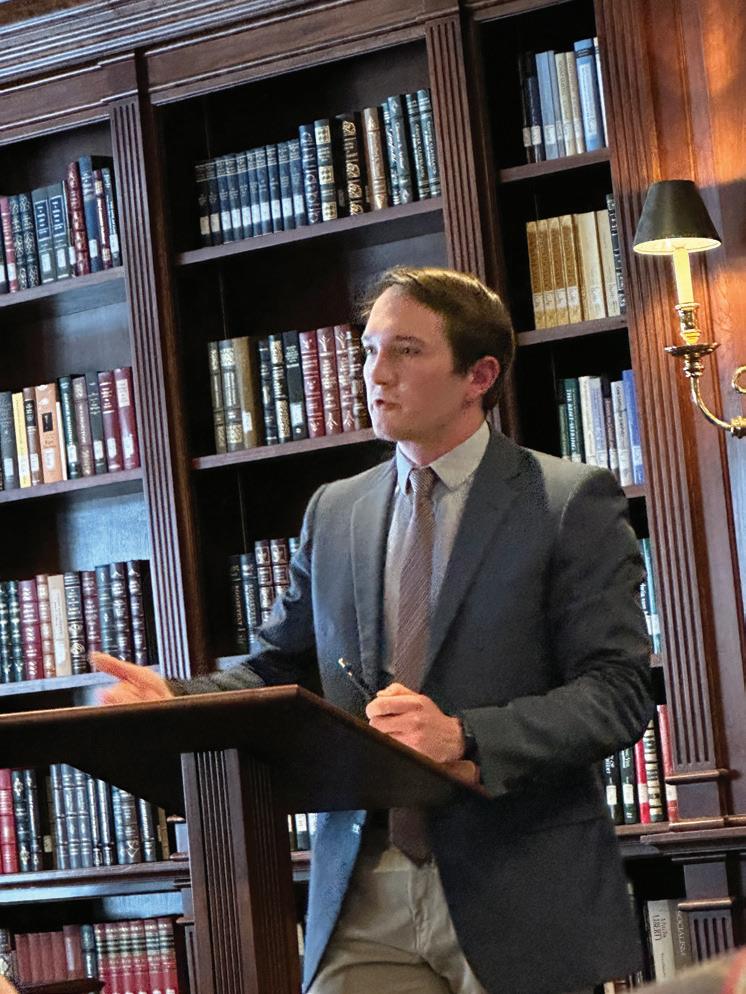
Whalen said because of the resurrection, Hopkins comes to see Heraclitean fire not as violent consumption but as redemptive transformation.
“Rather than denying it, he is forcing a reconciliation with that Heraclitean fire,” Whalen
said. “That there is the immor tal diamond, and that there’s going to be a change through which it goes, and yet that fire at the end, through the resurrection, is a renewing fire that makes it truly immortal for all eternity.”
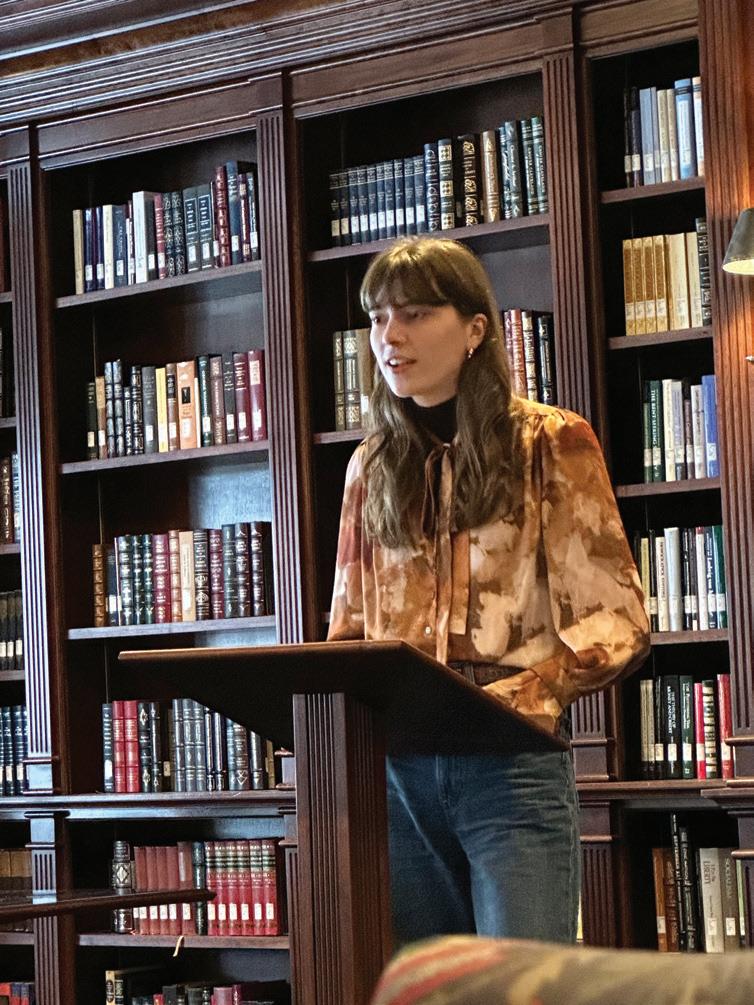
Baldwin’s lecture, titled “‘A More Tolerable Image’: Flannery O’Connor’s ‘The Partridge Festival,’” reflected on a Flannery O’Connor short story. In the story, the character Calhoun only comes to see the good in his neighbor and see himself for who he is after encountering the madman Singleton.
“Flannery O’Connor once described the main action in her stories as an action where the devil is the unwilling instrument of grace,” Baldwin said. “It is possible that Singleton may
play a role like that. In encountering him, Calhoun experiences the grace of seeing another and seeing himself.” Baldwin compared Calhoun seeing himself for the first time with Flannery O’Connor’s self-portrait and the Byzantine icon Christ Pantocrator.
“O’Connor paints herself with this symbol of humility while still painting herself in Christ’s image, perhaps to say that it is at her most humble that she most resembles Christ,” Baldwin said. “In a similar way, when Calhoun is most humble and most self-forgetful, he is most himself and most like his grandfather — in this sense the Christ reflection in miniature.”
Senior launches undergraduate literary journal
By Isabella Doer Senior reporter
While working at the Writing Center, senior Clare Oldenburg often found herself reading student essays and thinking: More people should see this.
Determined to create a space where students’ academic work could reach a wider audience, last month Oldenburg founded Apprenticii, a new online literary journal that publishes undergraduate English and literature papers.
“There are so many talented students here writing insightful papers, and I wanted to create a space where they could share their work and have something to show for it at the end,” Oldenburg said. “Just because work is done by undergraduates doesn’t mean it’s not rigorous or worth reading.”
The journal seeks to highlight close readings of great
books and encourage undergraduate scholarship.
“Your 10-page paper on the friendships in ‘Moby-Dick’ can have a fate other than languishing in your files. The detective work you did while tracing the presence of tiny red hands in Hawthorne’s short stories is no longer for naught,” the Apprenticii website says.
Since launching, Apprenticii has already published several essays, including Lucy Fernandes ’24’s paper, “Words Revealing Persons: The Role of Verbal Communication in James Joyce’s ‘The Dead,’” and Meg Smith ’24’s essay, “Jane, Janet, and the Rescue of the Beloved: ‘Tam Lin’ as a Source for ‘Jane Eyre.’”
The inspiration for Apprenticii, Oldenburg said, came from many places: conversations with friends about their coursework, her own experiences in the Writing Center, and even frustration
with the lack of quality she sometimes found in academic journals.
“I’d be on JSTOR, scrolling through articles, and think, ‘Some of the student papers I’ve read are better than this,’” Oldenburg said.
With that thought in mind, she spent her Christmas break designing the website, setting submission standards, and recruiting editors. Her efforts quickly garnered support from two former students: associate editors Smith and Fernandes.
“It sounded like an amazing and unique idea, and I wanted to help with it in any way possible,” Smith said. “I have several papers from undergrad that I was genuinely proud of, and I’ve read so many amazing papers written by friends as well. Creating an outlet where these ideas can be part of a larger conversation brings all of this scholarship, which would otherwise
be forgotten at the close of a semester, into the light.”
Fernandes’s enthusiasm for the project also stemmed from an appreciation for the depth and quality of student writing.
“Apprenticii is an important forum because it can allow for a free exchange of ideas, unencumbered by the limits of professional publishing or secondary criticism,” Fernandes said. “The stakes are low, but the potential fruit is rich. It is simply a place to share how academics have showed us something beautiful.”
Apprenticii focuses on publishing papers that engage with literary works, emphasizing close readings and analyses that explore “the goodness, truth, and beauty inherent in works of literature.”
“We want papers that explore great literature in a meaningful way, rather than chasing academic trends,” Oldenburg said.
The journal is still in its infancy, but Oldenburg said she has big plans for its future.
Currently, all submissions are published online, but she hopes to move to print publication eventually. She also wants to expand beyond Hillsdale to include submissions from like-minded institutions such as the University of Dallas and Christendom College.
“There’s a strong need for good, true, and beautiful art,” Oldenburg said. “And there’s an equally strong need for properly ordered understandings of that art. If we can help foster that, even in a small way, then Apprenticii is doing its job.”
Smith also envisions Apprenticii growing both in its reach and focus.
“I’d love to see Apprenticii expand to include journals focused on history, art, and other subjects,” Smith said.
Since launching, Apprenticii
has received positive responses from students, with one paper already undergoing the editorial process.
“We are still ironing out the exact process, but depending on who has the most time, one of the editors will review a paper, make any necessary suggestions, especially regarding spelling and grammar, and make sure the formatting fits our requirements for citations and notes,” Smith said.
As Apprenticii gains traction, Oldenburg hopes students recognize the value of sharing their academic work beyond the classroom.
“I think students sometimes undervalue their own work,” Oldenburg said. “But if you’ve poured hours into research and writing, why not share it? We’re all apprentices in this craft of learning, and that’s what Apprenticii is all about.”
Big Band to compete at Elmhurst, Notre Dame
By Megan Li Assistant Editor
The Hillsdale College Big Band will perform at the Notre Dame 2025 Collegiate Jazz Festival and 58th Annual Elmhurst University Jazz Festival in Indiana and Illinois, Feb. 21 and 22.
“We go to Elmhurst every year we are able to,” Director of Jazz Ensembles and Big Band Musical Director Chris McCourry said in an email. “This will be the first year we go to the Notre Dame Jazz Festival.”
The band of 18 students will take a bus to perform a halfhour set alongside bands from all over the country. The band will play “Four” by Maynard Ferguson, “Time Check” by Buddy Rich, “Black Orpheus” by Luiz Bonfá, and “Travelin’ Light” by Dennis Wilson, accompanied by senior Dravyn Spies on vocals.
According to McCourry, the
Along with considering Hillsdale credits and high school graduation year, Bollen said the school tries to honor seniors’ desires to move off campus in their final year.
“We have a commitment to the students that if you want to be off campus senior year, we want to honor that,” Bollen said. “That may sometimes mean overextending the number of permissions I have, which happened this year. I can’t say that this will always be the case, but as much as we can, we’re going to try and prioritize seniors getting off.”
Bollen said since more senior women requested to be off campus than there were spots, permissions were not granted to junior women in the first round. According to Bollen, senior women have a two-week period to accept or deny the permission, and depending on how many decline, permissions will go to junior women on a rolling basis.
“If enough seniors turn down their permissions, we can move down our respective lists in the next month or two into the list of juniors,” Petersen said.
Last year, Koon Residence was changed from men’s to women’s housing, which, according to Bollen, was prompted by an unexpected change in the number of incoming freshmen students.
“Last year, we anticipated having fewer freshman women, and then those numbers changed at the last minute and we realized we needed more
band goes out to compare itself with other college big bands and hear the music they have to offer.
Senior John Schaefer, the band’s lead trumpet player, said this is the ninth year the band is heading to Elmhurst.
“I don’t know how much I’ll be able to play after I graduate,” Schaefer said. “Our band is really good this year. I’m really happy with where everybody’s at — just hearing what we’re able to put on the table at the performances.”
Sophomore Mikayla Manna, a tenor saxophone player in the band, said the biggest highlight of the trip is seeing other big bands play.
“There’s no one winner, but usually they call out outstanding soloists from each band, and they get honored,” Manna said.
Senior Zachary Adams, the lead trombone, said the Notre Dame and Elmhurst festivals happen on the same weekend,
campus space for women than for men,” Bollen said. “At that time, we had already let many women off campus, so we decided it would be best to give that permission to older men, not younger women.”
According to Petersen, Koon, which houses 26 residents, will transition back to a men’s dorm for the incoming 2025-2026 school year in anticipation of having more men on campus.
“Koon is a swing dorm, which simply means it is one of the dorms that will swing back and forth from men’s to women’s and vice versa, depending if we need a balance of beds between the men and women,” Petersen said.
Switching Koon for the coming year will open up more possibilities for women to go off campus, according to Bollen.
“This year, we know our numbers and that we will need more room for men, so we flipped Koon back to men’s so that there is a higher likelihood that we can give more younger women off campus since so many older women already received it,” Bollen said.
Junior Madison Gilbert, head resident assistant of Koon, said she is disappointed that Koon is returning to a men’s dorm.
“I am sad that Koon is being switched back to a men’s dorm since we just rebuilt the culture of it as a women’s dorm,” Gilbert said. “It is also a cozy space that the women of the dorm this year truly made it their home. I don’t think it’ll have that same feel with men reentering its halls.”
Lydia Marshall, a sophomore and current Koon resident, also
with appearances from professional big bands and jazz ensembles.
“We’re leaving on Friday to hear the evening performance at Notre Dame,” Adams said. “We’ll play Saturday afternoon, then drive to Elmhurst, hear the night performance there, and perform in Elmhurst on Sunday.”
Freshman Morgan Milam, the band’s drummer, said she is very excited to go on her first Elmhurst trip.
“It’ll be fun and cool hanging out with the band — just nice to see everyone outside of our normal members during Thursday practice, hang out, and play some jazz,” Milam said.
Adams said having two performances this year, rather than one, and being able to see his sister in Chicago, will be the highlights of this trip.
“I’m excited to get to perform twice and get the nerves
said she is disappointed about the change.
“If this is what has to be done to fit everyone on campus, then it’s alright,” Marshall said. “There was some frustration because some of us thought there was a high chance it would stay a women’s dorm, and the thought of staying in the same room for two years was really appealing. The decision came out of the blue.”
Marshall said she experienced the abrupt switch of Koon last year from men’s to women’s during the housing application and was nervous about what the dorm would be like when it was time to move in.
“It switched two hours before our time slot for registration, which was after many girls had already gotten rooms and most of the other dorms were full,”
Marshall said. “I texted my friend who had lived in Koon for two years and asked her what the rooms were like and her experience there. She was really positive about it being a women’s dorm so we signed up for Koon and moved in in August not knowing what our room would look like or how big it would be.”
Gilbert said she is optimistic about the future of Koon, even with the difficulty of building culture as it switches between men and women from year to year.
“I hope Koon will return to a women’s dorm in the future years,” Gilbert said. “Especially since I know some amazing girls who would be super excited to RA there and build the dorm back up to its cozy state.”
out of me the first time and then go and give it all the second time,” Adams said. “I enjoy the relief of performance. There’s so much adrenaline built up, and everything always comes together at the last minute before we go up to perform.”
Manna said she loves seeing professional musicians at Elmhurst.
“We got to see Maria Schneider and her big band, and I actually love her music,” Manna said.
Adams said they also saw a performance from Count Basie Orchestra, an 18-member prominent swing jazz band formed by William James “Count” Basie in 1935 — one of Manna’s favorites as well.
“The most famous swing Big Band dude ever. We played a lot of his music,” Manna said. “They’re one of the few driving orchestras today.”
Adams and Schaefer said the band warms up by singing
through their parts under the performance hall to prevent fatigue during the concert.
“We laugh at ourselves a little bit doing that, but it’s super worthwhile, because then you just walk up, sit down, play, no talking in the middle,” Adams said. “You just go straight through the set, and judges give you feedback, which sometimes is underwhelming or disappointing, but you know what you did well and what you might have messed up. The stress of performing together is what makes it worth it.”
Schaefer said the limited practice times and challenging learning curve of Big Band have been formative for him as a musician.
“More of it comes down to being a player, and also you just get much better at learning to sight-read,” Schaefer said. “You are kind of forced to sink or swim when you’re thrown in there, and it helps you grow a
lot as a musician really quickly.”
Schaefer said the band always goes to the same restaurant and enjoys watching movies in their hotel rooms.
“Last year, we convinced the waitress at the fancy Italian restaurant we were at that it was our band director’s birthday. He didn’t know about it,” Schaefer said.
The Hillsdale College Big Band will perform their full set in a send-off concert in McNamara Hall Feb. 20 at 8 p.m. They will also perform April 11 and 12 at 8 p.m. in Plaster Auditorium as their biggest spring concert, featuring professional trumpet player Vince DiMartino.
“Chris McCourry is a really good trumpet player. These guys are legends to him,” Adams said. “It’s a chance I’ll never get any other time.”
Family Feud will pit profs against student affairs
By Joseph Peshek Collegian Freelancer
The Student Ministries Board will host a night of Family Feud Feb. 25 at 7 p.m. in Plaster Auditorium. A team of six professors will face off against six student affairs staff.
“The panels for the two teams are larger than last time, which should make it far more energetic,” College Chaplain and Director of the Student Ministries Board Adam Rick said. “I also really like to see a kind of intramural rivalry between faculty and student affairs staff. Who knows students better? We’re about to find out.”
The professor team includes Assistant Professors of Education David Diener, Jonathan Gregg, and Joshua Patch; Assistant Professor in Medieval History Charles Yost; Assistant Professor of Theology Cody Strecker; and Assistant Professor of History Miles Smith.
The student affairs team features Associate Dean of Men
Seniors from A1
According to Timmis’ email, Whalen and Baldwin’s lectures were the students’ response to the Associate Professor of English Dwight Lindley’s Opening Charge in the fall.
Jeffery Rogers, Director of Student Programming Rachel Marinko, Director of Academic Services Christy Maier, Dean of Women Rebekah Bollen, Director of Campus Recreation Ryan Perkins, and Director of Health Services Brock Lutz.
Students can participate in Family Feud ahead of time by scanning the posters’ QR codes around campus and filling out the survey of 11 questions related to religion and faith life. Questions include, “Which Old Testament story would make the best reality TV show?”
On competition day, each team will be posed with these 11 questions related to the religious preferences of the student body. The team that guesses the most popular answers and amasses the most points will win a prize.
“I do not have sufficient data to calculate my chances of winning or losing,” Diener said. “However, I can predict that my chances of having fun and enjoying the evening are high.”
“I talked about how literary texts are analogous to people,” Lindley said. “The way we relate to them is similar to the way we relate to other people. Good books are kind of like friends. They have a dignity that other people have.”
Lutz said he feels more confident about his team’s chances of securing a victory.
“Honestly, I think it will be a slaughter,” Lutz said. “When you have people on your team like Miles Smith and Jon Gregg, that is clearly a disadvantage. Their heads are so high in the clouds that they can’t even imagine how normal human beings will answer everyday questions. I mean, have you ever tried to have a normal conversation with those guys? Impossible.”
Senior and Student Ministries Board member Alex Schrauben said there are three reasons students should attend Family Feud.
“The teams are absolutely iconic,” Schrauben said. “Our questions are hilarious and really tap into campus culture, and Nathan Stanish as our Steve Harvey will be wearing a bald cap and mustache while he hosts. It’s going to be a blast.”
Lindley said both the Opening Charge and the Senior Vade Mecum lectures served to excite the department faculty and English majors for studying literature. “The books themselves could be the companions to a good life,” Lindley said. “You become who your friends are. Your friends rub off on you and form you. I think it’s really true with books and entertainment more broadly. The kind of stuff that you take in becomes who you are.”
Students to recite Gospel of Luke Library adds free resources
By Aurelia Mayer Collegian Freelancer
Mossey Library added new online resources this semester, including a subscription to the Washington Times, Routledge History Handbooks, and research guides organized by librarians.
“Many of our resource acquisitions are driven by recommendations from faculty,” said Technical Services Librarian Brandon Hugo.
This includes two new sources that the library has added: recordings of thirty Shakespeare plays performed at the Globe Theater and a subscription to Routledge History Handbook, which Hugo says will be added to the library’s website soon.
Hugo said he thinks the Routledge History Handbooks, a series of e-books that cover a span of historical topics, are a good resource for students.
“They’re really good primers for students because each handbook covers different aspects of a topic written by a scholar in that field,” Hugo said.
Along with new e-books and videos, the library is adding The Washington Times to their collection of newspaper subscriptions.
“The offer for free Washington Times in the Student Newsletter came about from the newspaper contacting us wishing to offer free subscriptions to students,” Hugo said. “The library has decided to supplement the offer with a paid subscription so that faculty, as well as students can use it.” Students, faculty, and staff can all activate a free subscription to The Washington Times.
“We’re giving a subscription to all faculty and staff who want it, and we’re paying for that,” Hugo said.
Virus from A1
Senior Ruthie Chinery, house director of Benzing Residence, said housekeeping will stop entering rooms to collect trash to try to avoid becoming sick.
“But our housekeeper has been sanitizing high-touch areas as much as she can all week,” Chinery said.
Junior Olyvia Oeverman, head resident assistant of Olds Residence, said six women have had norovirus symptoms and at least 10 others have missed class with flu-like symptoms.
“Our house director, ‘Mama A,’ Ava Ramuni, and housekeeper Tammy Fain have been our heroes in this situation,” Oeverman said. “Mama A has visited all of the sick residents, giving them soup and oranges, checking temperatures, and communicating with the deans to excuse absences. Our housekeeper has been disinfecting door knobs, cleaning the carpets, and handing out emesis bags and masks to any girls who don’t feel well. We’re so grateful for their service to us.”
Sophomore Ava Jolley, resident assistant in McIntyre Residence, said she noticed significant absences in class.
“One of my classes normally has 25 people and it had nine or 10 today, all out for sickness,” Jolley said. “There’s a couple people that are sick at least in my hall, but not all of them have the norovirus and stomach situation — some of it is flu, because that’s also going around, but in our hall, I think it’s like 50-50 flu and norovirus.”
Jolley said she thinks freshmen are getting sick more than other students.
“It’s understandable, because they haven’t been in constantly close spaces with other people yet, so their immune systems aren’t used to it,” she said.
Jolley said the McIntyre house director put out Emergen-C for
The link to access the free subscription can be found under “Academia” in the Student Activities Office Newsletter, Hugo said.
The library’s new research guides provide a vast collection of research advice and primary sources, organized by Public Service Librarians Brenna Wade and George Allen. Hugo said he believes research guides could be of use to students.
“Our research guides provide helpful tips and links for using library resources,” Hugo said. “We have both general guides on topics such as finding primary resources and citations as well as subject guides for specific academic disciplines such as classics, English, and history.”
Andrew Winter, a junior majoring in history and English, said he thinks the research guide will help him organize for his writing assignments.
“I like how they lay out the basic tips you need to know and sort out the library’s many different databases,” Winter said. “I’m kind of an unorganized researcher, so having it all laid out stepwise is very helpful.”
Kattie Kim, a freshman, said the research paper guide will help her in classes such as Great Books, especially when reading books like “The Iliad” and “The Divine Comedy.”
“The research guide would be especially helpful for me since I didn’t come from a classically-educated background,” Kim said. “So I think I would find a lot of resources that would help me get some context for the Greco-Roman world.”
People interested in learning more can contact Brandon Hugo at bhugo@hillsdale.edu.
the residents. She said students should practice common sense if they are sick.
“If you just wash your hands like a normal human being with soap and hot water, and you don’t cough into another person’s face, you should be fine,” Jolley said. “Don’t go around licking people or anything — that’s just stupid.”
Associate Dean of Men Jeffery “Chief” Rogers said students should take responsibility for their health. He said the college would not cancel classes as numbers rise.
“This is a self-governed institution, so we want kids to let somebody know, and then get something to help you with that,” Rogers said. “Don’t stay in a room and dehydrate yourself. Wash your hands and use proper hygiene, and don’t throw up on the stairs.”
Junior Phaedra Kelley said while she hasn’t caught influenza or the norovirus, she’s been trying to boost her immune system.
“When it comes to regular illness like colds and flus, I often take herbal tinctures with echinacea, goldenseal, or ginseng that I’ve found at the local natural grocer,” Kelley said. “I swear by these given that I would always get sick before I started them, and now the campus illness of the month almost never gets me, and when it does, I’m able to bounce back pretty quickly.”
With the latest sickness, Kelley said she is prioritizing her gut health with probiotics.
“I figure the more prepared I am, hopefully the better the symptoms will be if or when it gets me,” she said. “I’ve bought sauerkraut, yogurt, and recently picked up some homemade kefir from a friend. I’ve also upped my vitamin C intake and stocked up on electrolytes. Lastly, I bought some easy food I can make for myself to avoid Saga or AJ’s for as long as possible.”
By Joseph Peshek Collegian Freelancer
The Hillsdale Memorization club will host a memory recitation of the Gospel of Luke Feb. 23 at 2 p.m.
The event will take place in the Mauck Solarium, and 24 students will participate in the recitation.
Junior Miriam Ritchey said there is a deep history of public Scriptural recitation in the church.
“I hope people will come to the recitation as it will provide an opportunity to hear the Gospel in the same manner much of the early church, which has sadly been lost to much of our culture today,” Ritchey said.
Until now, club members have focused on memorizing various poems, passages, and speeches and delivering them individually. The upcoming Luke recitation constitutes the first concerted effort by
the club to share a lengthy narrative.
“I have wanted to host a recitation that required the collaboration of individuals which would produce a recitation of a longer narrative,” Ritchey said. “I was amazed by the response of the campus and am excited to be part of the recitation.”
Sophomore Ellery Toman said memorization is best done in community.
“Just as the process of
memorization is easiest when done with others, so too the fruits of memorization are best when enjoyed together,” Toman said.
Club members also see the upcoming recitation as an expression of the unity of the church, both at large and on campus, that can be enjoyed through Scripture.
“As a Christian college, we see Scripture as a means of uniting our common faith on campus,” Ritchey said.
Major general will teach on national security
By Ty Ruddy Assistant Editor
Major General Melvin Spiese will visit Hillsdale College for the fourth year in a row to give a one-credit course on post-Cold War national security in the U.S. for the Military Strategy minor beginning next week. The class will run from 3-5 p.m. on Monday, Wednesday, and Friday from Feb. 24 to March 7.
Spiese retired from the Marine Corps after 36 years of service in 2013. He said the class will spend time studying the national security plans of each administration since World War II to gain the best understanding of strategy in national security.
“We’ll try to give a synopsis of each president and then look at specific cases to see where certain administrations followed through and where they fell short,” Spiese said.
Spiese said the class becomes more in-depth when it reaches the midway point of Reagan’s presidency. From there, he said students will learn how major Cold War events influence strategy even today.
“For the first time, by the National Defense Authorization Act, Reagan was required to publish a national security plan, and it ended up being a good synopsis of the Cold War up to that point,” Spiese said.
“We are able to look at major events — NATO, Germany being admitted to NATO, and
occupations in the Middle East — all of which inform the way we shape our outlines today.”
Spiese said the United States faces similar problems today as it did during the Cold War, but there are some unfortunate sticking points in the military apparatus.
“There seemed to be some consistency and coordination on strategy between administrations during the Cold War,” Spiese said. “Now, the whole thing is in disarray.”
Spiese said the class will also explore the rise of other superpowers, like China and Russia, since the fall of the Soviet Union itself in 1991.
Even military disasters like the drawn out wars in the Middle East and the evacuation from
Afghanistan are teachers.
Junior Hudson Jones said Spiese’s class is well worth a two-week time investment for anyone interested in 20th century history.
“General Spiese’s course is a thorough and truthful analysis of the different national security strategies set forth over the last 40 years,” Jones said.
Ultimately, Spiese said, the class will ask what the next generation of national security leaders might learn from the past.
“Hillsdale College does a lot in the way of policy,” Spiese said. “I’d like to see if there might be room for Hillsdale students and graduates to influence US national security, too.”
Anglican fellowship seeking applications
By Michaela Estruth Senior Editor
Hillsdale students are invited to apply to the Whitaker Fellowship for remote work in researching, editing, and publishing of theological texts, according to alumnus Josiah Leinbach ’20.
“Fellows will focus on republishing classic, Anglican theological texts and studying the rich theological, liturgical, philosophical, and aesthetic inheritance of the Anglican tradition,” Leinbach said.
Leinbach, who created the fellowship, said it is open to students of any ecclesiastical background. The fellowship is an eight-week program with 10-12 hours of remote work a week, Leinbach said. At the conclusion of the summer, students will receive a $500 stipend.
Students will also be credited as editors or co-editors on all the work they do, according to Leinbach. In addition to experience in theological retrieval and republication, students will hear lectures from various Anglican leaders and theological voices, including some Hillsdale professors.
“The Whitaker Fellowship will engage students in the vibrant, vital, and resurgent work of Protestant retrieval, work that inspires the confident confessional
Wood from A1
Morrison said he was undeterred by the need for more fuel and equipment.
“I suspect that there’s going to be more demand for this firewood ministry than we’re able to meet at first,” Morrison said. “I think more people are going to be interested in receiving wood from our bank than we’re able to provide. So I would love to see it grow.”
Brady said the Catholic Society has a surplus of young men interested in volunteering their time to the ministry.
“There’s more labor available than there is anything else,” Brady said. “It’s a great concept — it gets boys out there working as a unit on a project that’s healthy for people physically, mentally and spiritually. Just having the labor available is a
Protestantism inherent to the Anglo-American tradition,” Leinbach said.
Theological retrieval of early Protestant thought enables any Protestant to understand the history of his tradition, according to College Chaplain Rev. Adam Rick.
“Christians should on average be better informed of their own theological history than they are,” Rick said.
Part of theological retrieval work includes modernization of texts, Rick said. Modernization translates old English, while remaining faithful to the author’s style and voice. Rick said Christians should study what early Protestant leaders said on given topics that have re-emerged in modern culture.
“In our current culture, people are asking questions that early Protestant theologians discussed,” Rick said.
“It is comforting to read these theologians to know they also wrestled with these things. Returning to these texts gives us a launching pad to dialogue with them.”
Leinbach said he is partnering with Prolego Press, an Anglican publication founded by Robert Ramsey ’14 and based in South Bend, Indiana.
“Prolego Press is vital to the work of theological retrieval,” Leinbach said. “It is a vanguard of this important movement that includes
big thing, but this is the kind of labor that’s directed to a fine point for a particular type of project, and that’s actually fun because you learn a lot more that way.”
Sophomore Samuel Montone said his time at the first cutting was formative.
“This whole project comes from the Catholic ethos,” Montone said. “Helping the people in our community who are in the most need, this is what the Church has done for 2,000 years. This spirit is what gave us hospitals and universities, this is why we decided to keep volunteering for this project to Catholics — it’s a way to keep alive the Catholic spirit as we extend the mission of the Church.”
At the end of the day, Morrison said, the ministry is about helping community members both physically and spiritually.
scholars across traditions and various institutions. This is a Hillsdale endeavour by nature because it seeks to return to the sources.”
Leinbach said he named the fellowship after William Whitaker, a 16th-century Anglican churchman and intellectual. This spring, Prolego Press is republishing Whitaker’s treatise “A Disputation on Holy Scripture.” This republication is the first edition since its translation from Latin in 1849 and includes thousands of source citations, footnotes, and biographical notes, according to Leinbach.
“William Whitaker embodies both the intellectual rigor and devotion we want to see cultivated in our fellows, so along with our significant republication of Whitaker’s Disputation, it seemed like an obvious choice,” Leinbach said.
Junior Emma Wilkinson aided Leinbach with polishing the work last summer.
“My main responsibility was finding modern editions of ancient and patristic texts, both online and in Mossey Library, and writing Chicago Style footnotes to cite them,” Wilkinson said. “I also did various formatting, proofreading, and modernization tasks, while other students assisted in the translation of Greek and Latin phrases in the text.”
“We open our activities with prayer,” Morrison said. “When we’re giving our firewood to people who are in need, we’re praying for them. We’re welcoming them, inviting them to
Wilkinson said she researched patristic fathers she had never studied and learned how to format anthologies — collections of compiled works for publication.
“I enjoyed tracking down the works by obscure church fathers, many of whom I had never heard of, and learning how the edited anthologies that we use every day in class are actually created,” Wilkinson said.
Interested students should send their résumé, a cover letter, and the contact information for an academic and pastoral reference to josiahleinbach@gmail.com by March 14. Finalists for interviews will be notified by March 19, and the program’s applicants will be notified of acceptance by April 11, Leinbach said.
Wilkinson, who is planning to study abroad this summer, said she will also apply to the Whitaker fellowship and hopes to continue her work editing and researching.
“I think anyone interested in writing and research, especially in the realm of church history should apply to the fellowship because it is an excellent opportunity to practice professional skills related to editing and research,” Wilkinson said.
come to church, to be more involved in church activities and praying for them, if they’d like to be prayed for. It’s a very holistic approach.”
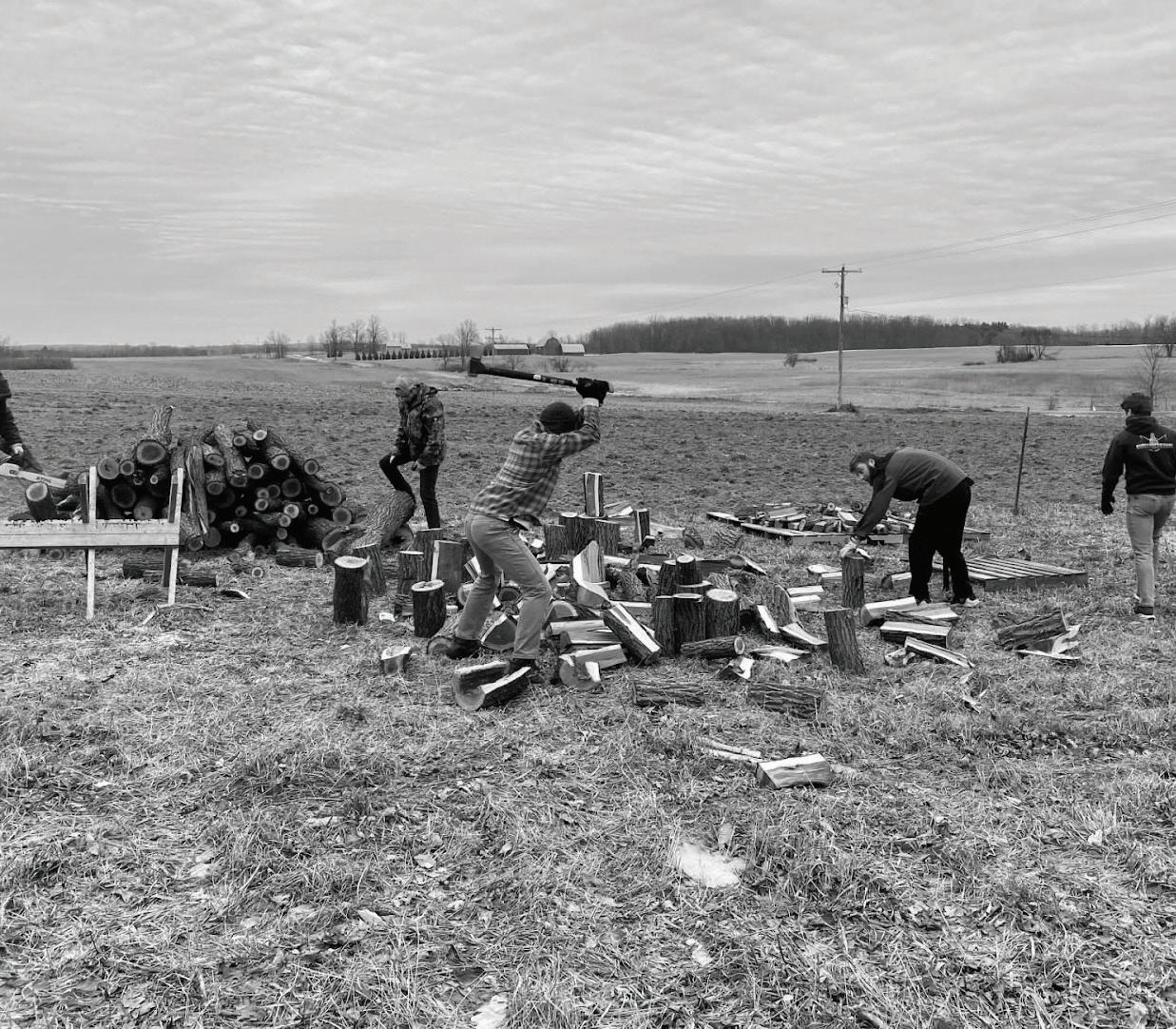
Opinions
The Collegian Weekly
The opinion of the Collegian editorial staff
Find peace in application season
Editor-in-Chief | Jillian Parks
Managing Editor | Isaac Green
Senior Editor | Michaela Estruth
Outreach Director | Olivia Pero
Design Editor | Ally Hall
News Editor | Catherine Maxwell
Opinions Editor | Caroline Kurt
City News Editor | Thomas McKenna
Sports Editor | Jacob Beckwith
Culture Editor | Colman Rowan
Features Editor | Kamden Mulder
Social Media Assistant | Sam Otting
Circulation Manager | Lauren Bixler
Assistant Editors | Megan Li
Jewelry exposes reality of IVF
By Isabella Doer Senior Reporter
Jewelry often represents deeper meaning — wedding bands signifying commitment, cross necklaces indicating faith, heirlooms preserving generational connection. But a new trend takes the concept of sentimental keepsakes to an unsettling extreme.
Recently, companies like ICE Keepsake Jewelry and Blossom Keepsake have started advertising a service that turns what they call “leftover” in vitro fertilization embryos into jewelry. The process encases frozen embryos — human lives created but never implanted — in rings or pendants as a way for parents “to honour and cherish the journey they have taken to bring life into the world,” according to Blossom Keepsake.
Conveniently, what these ads don’t mention is removing an embryo from cold storage kills it. Cold storage preserves, at least, the possibility of implantation and life, whereas turning an embryo into jewelry destroys that small life.
One viral ad from Blossom Keepsake framed the decision in chillingly casual terms: “POV: you’re an IVF mama who needs to decide what to do with leftover embryos.” It’s difficult to overstate how grotesque this is.
Michael Knowles, a conservative commentator, described the process bluntly on his show.
“Well, this jewelry company says, ‘You know what you can do? You can put them [the embryos] in jewelry and wear your kids’ cadavers around on your finger all day.’”
For decades, IVF has been framed as a compassionate advancement which gives infertile couples a chance to have chil-
dren. The reality, however, is far less sentimental. Few pause to consider the moral cost.
IVF is rarely as simple as creating and implanting one embryo at a time. The process often involves producing multiple embryos, with only some selected for implantation. The rest are stored indefinitely, discarded, donated to research — or now, repurposed into jewelry.
As of 2024, more than 1.5 million frozen embryos are stored across the United States, according to research at John Hopkins Public Health.
What was presented as a medical solution for infertility has since revealed itself to be an industry that commodifies human life and strips it of its sacredness. Behind the promise of helping couples conceive lies a system that treats embryos, not as lives with inherent dignity but as products to be stored, selected, or discarded at will.
The introduction of embryo jewelry is not a shocking development, but the logical outcome of a process that has always reduced human life to a byproduct of convenience.
The one good thing about the viral jewelry ad is that it lays bare what has long been obscured.
For too long, people have dismissed concerns about IVF and surrogacy, focusing only on the children who are born — not the millions left behind to be frozen, discarded, or sold.
This is the turning point. Turning a child’s remains into jewelry is anything but sentimental. It is an admission of what IVF has always been: a process that manufactures life but does not protect it.
Isabella Doer is a senior studying English.
It’s February, so people have probably started asking about summer plans. Handshake pings you with so many job opportunities, your inbox feels like a game of whack-a-mole.
The spring semester always comes with a slew of unanswered questions concerning next year’s housing and post-graduation jobs, resulting in a stressful thought spiral. It’s easy to fall into the mindset
that if you don’t get your dream position, you’ll permanently jeopardize your future.
But remember that physics majors have become lawyers, that people who’ve never gone to school have started multi-billion-dollar companies, that the poorest people can be the happiest, and those who have seen the worst of humanity have found true joy and peace. The possibilities are end-
less — and that’s a good thing.
This world is interconnected, constantly in flux, where no path has a dead end unless you make one. You might not earn a cent this summer.
You might have nothing new to add to your resume. You might hate your job. But to define yourself by your circumstances is to make your world smaller and more miserable.
Gratitude enables us to look at
the days ahead with childlike wonder and excitement, rather than dread.
This is Hillsdale, so we don’t need to tell you that it is important to do your best, but it’s also important to accept that some things are beyond your control. No application result, housing outcome, or job offer can compromise your peace unless you let it.
It's hypocritical to worship Musk
By Nathan Stanish Ad Manager
Elon Musk is the new darling of the Republican Party and a blatant example of modern conservative hypocrisy.
Before the 2024 election, the billionaire most conservatives cared about was George Soros, allegedly the mastermind behind the Democratic Party’s success in the 21st century. What Musk has done in the last two months puts Soros to shame.
In the last few months, Musk donated $277 million to President Donald Trump’s campaign — more than Soros has spent in the last eight presidential and midterm elections combined. Musk received a special government position granting security clearance with zero Congressional approval, for an organization he named after his meme coin. Some have heralded Musk’s Department of Government Efficiency as the solution to the government’s wastefulness. That hardly excuses the growing pile of lawsuits as DOGE accesses sensitive information and pressures government employees into retirement. Fourteen states sued Trump and DOGE, alleging Musk’s power is unconstitution-
al. His power is unprecedented for a person neither elected nor congressionally approved.
DOGE has drastically reduced the United States Agency for International Development, which is responsible for global health, disaster relief, and socioeconomic development in foreign countries. USAID shrunk from 10,000 employees to fewer than 300 employees. The White House cited 12 examples of wasteful spending to justify the reduction, accounting for 1% of total USAID spending. Fact-checkers identified the majority of those examples as state department expenditures, not USAID expenditures, and discovered other false or misleading claims in the list. Even if every example cited was accurate, that does not justify a 97% employee reduction.
Musk does not limit his political meddling to the United States. He supports Alternative für Deutschland, a far-right party in Germany labeled a “suspected extremist organization” and placed under government surveillance by Germany’s federal domestic intelligence agency — a move upheld in court, twice. Björn Höcke, the leader of the party’s far-right faction, said
Germany should make a 180-degree turn on its attitude toward its Nazi history after calling a memorial to murdered Jews in Berlin a “monument of shame.”
Musk spoke at the party’s 2025 rally and said Germany has “too much of a focus on past guilt and we need to move beyond that.” His comments are at best irresponsible, considering AfD’s unusually high rate of Holocaust denial, and at worst an endorsement of Hocke’s standpoint.
That rally came days after Musk twice used a gesture identical to the Nazi salute at Trump’s inauguration — a move fiercely defended by conservatives as a harmless attempt to symbolize giving his heart to the crowd.
Musk apparently was too busy posting Nazi puns on the social platform X to explicitly deny the meaning of his gesture.
Speaking of X, conservatives cite the Musk-owned social media site as evidence of his business acumen and commitment to free speech. His commitment to free speech has been especially useful to Russian propagandists.
According to an EU commission, X has more Russian disinformation than any other social media site. The nonprofit Reset credited that to Musk’s dismantling of
safety standards. X recently paid a $5.2 million fine to the Brazilian government for failing to ban 100 accounts flagged for misinformation, hate speech, and attacks on democracy. This does not bother a majority of conservatives. The Pew Research Center found that 73% of Republicans have a favorable view of Musk, despite 54% of Americans expressing unfavorable views of Musk.
Republicans lose credibility when they turn a blind eye to a billionaire’s political and business track record, so long as he supports the correct side. If a Democratic billionaire became Harris’ biggest donor in the election and then received an ambiguous government position with wide-sweeping power and confidential information, Republicans would riot. Instead, they hail Musk as a visionary and a genius. Through rose-tinted glasses, Musk’s red flags look like normal flags. Partisan loyalty is no excuse for supporting a corrupt billionaire with no regard for the Constitution.
Nathan Stanish is a senior studying religion.
Letter to the Editor
By Christopher Martin Guest Writer
Economists love to describe tradeoffs (“on the one hand…. on the other hand”), so much so that a frustrated Harry Truman once asked for a one-armed economist. So I appreciated how your recent article (“Hillsdale Professors Discuss Tariffs,” Feb. 13) represented the many nuanced considerations about the Trump Administration’s rapidly evolving tariff policy. But as someone quoted in the article, I want to restate my own bottom-line view more clearly. The policy is a mistake. In principle, yes: Tariffs can give negotiating leverage to achieve overall freer trade.
Whether that will work — and in particular, work better than the postwar multilateral approach — is a question of political prudence. Intelligent people can absolutely disagree about this. But I think we should be clear-eyed. This policy risks setting off cycles of mutually destructive retaliation and costly renegotiation. And as long as tariffs are in place they harm not only American consumers but also businesses with international supply chains, including defense firms, whom it seems extremely perverse to harm right now. Even on-againoff-again tariffs impose crippling uncertainty on businesses, delaying hiring and investment decisions. And the impact on
our political culture will be dire: Businesses and legislators are already supplicating the White House for special exemptions from the latest blizzard of tariffs. Presidents will surely wield this kind of discretion to our cost if we normalize it now.
Finally, I would like to say something on behalf of the foreigner, from whom we are not to withhold justice. The world being imperfect, sometimes our least bad courses of action hurt foreigners for things their leaders do beyond their control. But the bar for doing that surely should be high. We ourselves would want to be treated with a measure of grace in similar circumstances — for instance, for not fully controlling the
smuggling of guns across the northern border to Canadian criminals. Were the first tariffs, for instance, really the only diplomatic tool to address the modest amounts of fentanyl coming from Canada, or the much greater amounts coming through Mexico, a much less capable state? Had those governments really so wronged us that we were justified in disrupting the livelihoods of millions of peaceable people? I don’t claim the answer is indubitably clear. But we should always be asking that question, for their sake as well as our own.
Christopher Martin is an associate professor of economics.
Trump administration supports modern journalism
By Charlotte Knobloch Collegian Freelancer
Although mass media’s hold has broken down in the 21st century, much of our information comes from just a few sources. Almost imperceptibly, a small group of people influences everything we see. The opening of White House Correspondent seats to the public is a step in the right direction. The Trump Administration announced it would be opening The White House Correspondents’ Association to applicants on Jan. 29. What was once limited to the select invitees is
now available to any applicants. Traditionally, the WHCA exclusively contains staff from major news organizations; following this decision, ordinary citizens may join.
Although journalists in the top 3 main levels of membership must be “employed on the editorial staff” of a newsgathering organization, independent journalists can request media seats, which allow freelancers to cover stories without being on an editorial board.
President Donald Trump’s decision reflects a new age of journalism. Over the past decade, the number of online news
influencers and independent journalists has grown. Now, 54% of Americans say they get news from social media. Allowing these independents to join the WHCA both validates their work and expands the WHCA’s audience.
“Millions of Americans, especially young people, have turned from traditional television outlets and newspapers to consume their news from podcasts, blogs, social media, and other independent outlets,” Press Secretary Karoline Leavitt explained to the press.
To repair trust with its citizens, the Trump administration
is demonstrating that they have nothing to hide. In this way, Trump’s move was both progressive and strategic. By opening the press briefing room, he encourages the perception of credibility. Distrust in legacy media has grown in the past decade. If the Trump administration is being covered by a wide spectrum of reporters, news may seem more trustworthy.
Many news organizations have turned up their noses at Trump’s announcement. The Free Press says that the president’s club of journalists was once “proper.”
“Think: wooden panels,
think: Scotch, think: ink,” Nellie Bowles wrote Jan. 31. She painted a picture of a dark room, tenured journalists sipping liquor in privilege, contrasting it with “Hooters and a BA in communications.”
Many media organizations encourage us to believe that opening up media seats is negative. But will much really change? The administration has always chosen the members of the WHCA. This is still the case. Independent journalists now have an equal opportunity to report alongside correspondents from major corporations. Rather than detracting from the
exclusivity of the club, this move continues to offer positions to the best of the best. The WHCA won’t suddenly be home to bad poets and journalism rejects. Rather, Trump gives a new avenue to nontraditional but highly influential news reporters. This can only improve the quality and credibility of the press.
Charlotte Knobloch is a freshman studying the liberal arts.
In a US–Vatican spat, ordo amoris stands true
Pope Francis gets American immigration wrong with his recent letter to the American bishops
By Elijah Guevara Collegian freelancer
Rarely do popes and American politicians spar over Catholic theology and national policy.
That changed Jan. 29, when Vice President J.D. Vance appeared on Fox News to justify border security and mass deportation with what Vance called an “old-school” Christian concept.
“You love your family, and then you love your neighbor, and then you love your community, and then you love your fellow citizens in your own country, and then after that, you can focus and prioritize the rest of the world,” Vance said, concluding the far left has completely inverted this concept of ordered priorities and obligations.
This clip went viral on social media almost immediately, sparking outrage from leftists and skeptics who accused Vance of dishonestly appropriating Christian principles to justify President Donald Trump’s immigration policies.
Many took issue with Vance’s status as a 2019 Catholic convert, challenging his ability to explain his political stance through his religious beliefs.
Responding to one such accusation from British Member of Parliament Rory Stewart on X, Vance tweeted Jan. 30 his argument is based on “ordo amoris,” a millennia-old Christian theological and social teaching developed by St. Augustine and St. Thomas Aquinas.
St. Augustine explains the “ordo amoris,” which is Latin for “order of love,” in his book “On Christian Doctrine.”
“Since we cannot do good to all, we ought to consider those chiefly who by reason of place, time, or any other circumstance, by a kind of chance are more closely united to us,” Augustine wrote.
Nearly two millennia after Augustine, Vance brought this social teaching into the political limelight.
“The idea that there isn’t a hierarchy of obligations violates basic common sense,” Vance wrote on X. “Does Rory
really think his moral duties to his own children are the same as his duties to a stranger who lives thousands of miles away? Does anyone?”
The idea was straightforward: A secure border and the defense of American rule of law upholds, not contradicts, the principles of Christian charity through our obligation to our own communities and citizens.
Pope Francis disagreed. In a strongly-worded letter addressed to the American bishops published Feb. 10, the pope clarified his stance on Trump’s immigration policy.
“I have followed closely the major crisis that is taking place in the United States with the initiation of a program of mass deportations,” Francis wrote. “The rightly formed conscience cannot fail to make a critical judgment and express its disagreement with any measure that tacitly or explicitly identifies the illegal status of some migrants with criminality.”
The pope stated that an “authentic” rule of law is verified
Moderation isn't enough
By Lauren Bixler Circulation Manager
What do preserved fetal pigs and your Friday night cocktail at Rough Draft have in common? Cancer risk.
The International Agency for Research on Cancer classifies alcohol as a Group 1 cancer-causing agent alongside tobacco, asbestos, and formaldehyde. These links initially surfaced in 1988, but were reaffirmed in 2007 and 2010.
Christians often advise limited to moderate alcohol consumption in avoidance of sinful drunkenness. Scripture calls us to “not be drunk with wine, wherein is debauchery” (Ephesians 5:18), “for the heavy drinker and the glutton will come to poverty” (Proverbs 23:21).
The classically educated might recall the words of Aristotle who describes virtue as a mean between the vices of excess and deficiency.
But some things are harmful no matter how much is consumed. Excessive drinking may lead to physical dependence and spiritual poverty, but that doesn’t mean “moderate” drinking isn’t dangerous.
To explore what moderation with alcohol should look like, Southeastern Baptist Seminary Research Professor of New Testament and Biblical Theology Charles Quarles wrote on the ancient practice of winemaking and its associated biblical context.
to a call for abstinence from the more powerful alcoholic beverages consumed today,” Quarles wrote.
Quarles takes a strong stance, but it’s definitely one to consider whether or not you are Christian.
Understanding alcohol’s breakdown in the body and its associated risks also helps determine how much an individual may want to consume. Once laid out, the evidence suggests consuming no alcohol will always be better for your body than drinking, even moderately.
In an August 2022 podcast, Stanford School of Medicine Professor of Neurobiology Andrew Huberman describes the toxic effects of alcohol and why it can be carcinogenic with long-term use. The body metabolizes alcohol into a toxic compound called acetaldehyde. Put plainly, acetaldehyde is poison. It kills and damages cells
rupts the mood wiring in the brain. And with chronic alcohol use, the brain loses its ability to control impulsive behavior, even when completely sober. Chronic drinking can change the brain circuits that affect the ability to self-govern. These effects can be reversible, but not for those who have been chronically drinking for many years.
“There has been proposed to be anywhere from a 4% to 13% increase in risk of cancer, particularly breast cancer, for every 10 grams of alcohol consumed,” Huberman said. “In the U.S., one 12-ounce beer, one glass of wine, or a shot of liquor tends to include about 10-12 grams of alcohol.”
Losing control in moments of inebriation could harm others. Words and actions cannot be taken back. It’s much easier to not need forgiveness than to beg for it. Chronic alcohol consumption, which is only an average of 1-2 drinks per night, can make a tragic hypothetical scenario real.

indiscriminately. Since alcohol is both water-soluble and fat-soluble, it can penetrate all tissues of the body.
Importantly, wine at the time was diluted with at least double the amount of water, rendering the alcohol content around 3%. For comparison, Title 67 of the Mississippi Code names wine containing 5% of alcohol or less a nonalcoholic beverage.
“Eighty-proof whiskey has an alcohol content that is 1330% more potent than biblical wine,” Quarles wrote in a 2021 article.
Appropriate moderation is difficult to define when the baselines of normal alcohol content are hardly comparable.
“The cautions of the New Testament and early Christian literature reasonably translate
The body breaks down into acetate, a negligible fuel for the body. Huberman said this process is metabolically costly. If the body cannot do the conversion from ethanol to acetate fast enough, acetaldehyde will build up and cause more damage to your body — both in inebriation and long-term.
“It is the poison, the acetaldehyde, that leads to the effect of being inebriated or drunk,” Huberman said. “Being drunk is actually a poison-induced disruption in the way that your neural circuits work.”
The pleasure of intoxication many people describe is not a happy thing for the cells. The poison of acetaldehyde dis -
through how a country affirms the dignity of the poor and most marginalized, who ought not to be labeled as criminals if they have not committed “violent or serious” crimes.
“What is built on the basis of force, and not on the truth about the equal dignity of every human being, begins badly and will end badly,” Francis writes. “The true ordo amoris that must be promoted is that which we discover by meditating constantly on the parable of the ‘Good Samaritan,’ that is, by meditating on the love that builds a fraternity open to all, without exception.”
Although the pope is correct in that nations must treat all migrants with dignity and care, the longstanding position of Catholic social teaching appears at odds with his stiff stance against the Trump border policy.
According to the Catechism of the Catholic Church, paragraph 2241, “the more prosperous nations are obliged, to the extent they are able, to welcome the foreigner in search of the security and the means
of livelihood which he cannot find in his country of origin.”
In other words, the government must welcome the migrant, but not to the point that it harms its own people, as the government did under the Biden administration. The memory of ineffective border security and the violent crimes, homicides, and fentanyl deaths it brought into our communities remains crystal-clear in the American mind.
We cannot return to that.
Our nation’s first responsibility is not to “all, without exception” but rather to the needs of its own citizens. People who violate our laws are criminals and must receive just punishment — not because they are unequal or lack dignity, but because it preserves a lawful society. If enforced, the American rule of law creates a society worth lawfully emigrating to.
This ordo amoris, when applied to national policy, never suggests we must only choose between those close to us or the poor and marginalized; such an understanding pos -
es a false dichotomy. Rather, it teaches that we love those closest to us first and then those farther away, with the ultimate goal of benefiting both the citizen and the foreigner. The beliefs expressed in the pope’s letter are not binding on Catholics, since it was a personal letter to the American bishops, not infallible doctrine promulgated to the laity “ex cathedra.” Still, Catholics are obliged to respect the pope, even when they take issue with his personal opinions. Pope Francis challenges us to treat the most vulnerable and marginalized with dignity, a reminder all of us need.
The principle of ordo amoris, however, can serve Francis’ vision for migrants and the poor. After first meeting the needs of our own citizens, we can continue doing what America has always done: offering the American dream to people of all nations.
Christ says, 'Take and drink'
By Zachary Chen Assistant Editor
Jesus does not allow you to be a teetotaler.
If you are a Christian, you are required, mandated, ordered, welcomed, and invited by the word of Christ to drink alcohol, for he instituted his Holy Supper using alcoholic wine. The medieval church and the temperance-preaching Methodists had one sin in common: both denied Christians the Blood of Christ by denying them the wine Christ consecrates.
at the Lord’s Supper. What Christians may — nay, must — refuse, however, is the sin of drunkenness, which Noah exemplified in Genesis 9. The Bible expressly forbids alcohol throughout the Old and New Testament (see Romans 13:13 or Galatians 5:21, for starters).
ed that alcohol may lead to cancer. Yet these dangers — dangers of chronic overindulgence, by the way, and not of sparing consumption — are no reason to abandon alcohol completely, though they ought encourage prudent drinking.
In this life, we are called to community with other people. If bonding over a beverage helps build that community, that can be a beautiful thing. But alcohol should not become the common denominator of a relationship.
It’s clear alcohol causes damage at every sip. No amount of it will be healthy for you. But a glass of champagne on a special occasion, a beer with an old friend, or wine at communion, will not kill you.
There’s relative risk with many things we do in life, but no one can calculate risk out of the equation. So be wise when it comes to alcohol consumption. Ask yourself why you’re drinking and if the harm is worth the why. Often, it isn’t.
Lauren Bixler is a sophomore studying politics.
Illustrated by Maggie O'Connor.
Some, such as Southeastern Baptist Seminary Research Professor of New Testament and Biblical Theology Charles Quarles, argue that ancient wine was negligibly alcoholic.

Quarles writes that “the cautions of the New Testament and early Christian literature reasonably translate to a call for abstinence from the more powerful alcoholic beverages consumed today.”
Quarles implicitly argues that diluted wine in the New Testament means modern Christians ought to abstain from more alcoholic beverages today. What Quarles misses, however, is that alcohol is not in and of itself sinful — the sin of drunkenness is.
The Scriptures portray alcoholic wine as a good gift from God which may be abused, but which is not in itself sinful. Wine “makes glad the heart of man” (Psalm 104:15). Paul advises Timothy to “take a little wine, for the good of his stomach” (1 Timothy 5:23), and Christ’s first miracle involves a superabundance of wine — just read John 2.
Scripture never prevents enjoying alcohol outside of church. It only condemns drunkenness. Even if New Testament-era wine was less alcoholic than today’s drinks, it was still alcoholic. You need not drink socially, but you may not refuse to drink
The cans of White Claw littering the lawns of certain fraternity houses and Manning Street are disgraces and iniquities, just as an anti-Biblical, if well-meaning, use of Welch’s at the Communion table is a deplorable sin.
Within these two limits, drunkenness and teetotaling, however, lies a Christian liberty.
Chesterton’s “Omar and the Sacred Vine” provides a good rule: “Drink because you are happy, never because you are miserable, for this is the ancient life of the world.”
Drink at weddings. Toast to celebrate a birthday. Have a beer over a bonfire with a friend and praise God for the good gifts of his creation. These things are fitting and proper. Alcohol has been a staple of human celebrations for all of history. See Homer for a source beyond the Old Testament.
Don’t let health concerns take away the proper enjoyment of alcohol, either. Yes, overindulging in alcohol causes health problems: Addiction and liver damage come to mind. New research from Stanford School of Medicine Professor of Neurobiology Andrew Huberman has even suggest-
Don’t live in fear. Drinking alcohol is a Christ-sanctioned, historically-supported, and eminently natural way to express and enlarge human joy. Just do it in moderation. More people, however, believe they have fitting restraint than actually possess it. Most are familiar with and even agree with the call to drinking in moderation. Heeding it is the hard part. Teetotaling tramples upon moderation by denying the good of alcohol. Drunkenness spurns moderation by misusing alcohol. What you must do, therefore, is fight your inclination. If you are terrified of alcohol, you ought to drink a little more. If you are a seasoned imbiber and lean toward drunkenness, deny your desire and savor a smaller drink. In both cases, you will be better for both the alcohol and for the restraint.
One cannot adequately address the question of drinking properly, virtuously, and moderately in 600 words. Yet the proper use and enjoyment of alcohol exists, and a proper relation to it as a gift of God is possible for humans.
In the words of the old song “The Parting Glass,” “a man may drink and not be drunk.” And as someone wise once said, “Take, drink.” Strive for virtue in drinking, as in all of life.
City News

Hillsdale grad bids for Michigan GOP chair as convention nears
Joseph Cella ’91, a former ambassador under Trump, is “cautiously confident”

By Thomas McKenna City News Editor
Hillsdale alumnus Joseph Cella ’91 hopes to lead the Michigan Republican Party into the 2026 election cycle, and a “vast majority” of Hillsdale County Republican delegates will support him at the state party convention this weekend, according to county party chairman Brent Leininger.
“I’m cautiously confident,” Cella said. “You never know how these things turn out.”
Cella calls himself a “seasoned political combat veteran.”
After managing campaigns for Michigan Senate races, he worked as a staffer in the House of Representatives. He co-founded CatholicVote in 2005 and, during the 2016 election, Cella advised the Trump campaign on Catholic outreach before serving as ambassador to Fiji in the first Trump administration.
“He did a lot of work this last election cycle, working to get President Trump re-elected to office,” Leininger said. “We need somebody in that position who can bring the different groups of the party together to raise funds and support our candidates up and down the ballot in 2026.”
College President Larry Arnn endorsed Cella for chairman Feb. 7.
“Joe Cella is a splendid man, citizen, husband, father, and Republican,” Arnn said in a statement. “He will be a faithful and effective state chairman. Michigan needs him. I urge you to support him.”
After serving as ambassador, Cella returned to Michigan and worked with current Michigan Republican Chairman Pete Hoekstra — a former ambassador to the Netherlands and Trump’s nominee for ambassador to Canada — to block the
China-based company’s construction of an electric vehicle battery plant in Big Rapids, Michigan. The two former ambassadors said the plant posed a national security threat from the Chinese Communist Party.
Cella received a Distinguished Alumnus Award from Hillsdale College in 2023 for Outstanding Professional Achievement in American Diplomacy. His eldest daughter is a sophomore at the college, and another will attend starting next year.
At Hillsdale, Cella majored in English, minored in history, joined the Sigma Chi fraternity, and served on the Catholic Student Council. He also spent a semester in the WashingtonHillsdale Internship Program, where he interned on Capitol Hill.
“It provided me with a rigorous liberal arts education grounded in the Western ca-
non, and that was at a time when nobody was really doing that intentionally and doing it well,” Cella said. “I think it was certainly one of the number of waypoints in my life pointing me to a life in the arena of public policy, government, politics, and service to our country.”
Cella faces two other candidates: Meshawn Maddock, who served as former party co-chair with Ron Weiser from 2021-23, and State Sen. Jim Runestad, a Republican who represents White Lake.
Leininger said he is uncertain of how Runestad could fulfill his legislative and party duties, if elected, and said he was unsure of Maddock’s accomplishments in her time as co-chair.
The choice of chairman could determine the strength of Republican fundraising and campaign infrastructure heading into the 2026 governor’s contest, an open race for U.S. Senator Gary Peters’ seat, and state legislative elections.
The party’s leadership and finances were in shambles a little over a year ago after lackluster fundraising left the state party strapped for cash and deep in debt, according to The Detroit News. Former chairwoman Kristina Karamo criticized former U.S. Secretary of Education Betsy DeVos — a crucial, longtime donor — and she stopped giving to the state party. With only $35,000 in its bank accounts in August 2023, the party took out a $110,000 loan to pay actor Jim Caviezel to speak at its convention.
“I would say that the symptoms we‘ve witnessed over the last few years are probably part of a bit of a lengthier illness that has beset the party,” Cella said.
Karamo had only led the Michigan GOP for 11 months
City extends Camp Hope deadline
By Isabella Doer Senior Reporter
The City of Hillsdale extended the eviction deadline for Camp Hope to March 31.
Camp Hope, a makeshift homeless shelter behind Hillsdale Community Thrift, has provided beds, bathrooms, and transitional housing support to homeless people for nearly two years. Initially set for removal by Feb. 1, the camp’s director, Missy DesJardin, negotiated an extension to allow residents more time to secure housing.
DesJardin said the city sent her a letter Jan. 28 to move the deadline, and the city council confirmed the extension with her.
“The city had originally wanted us out by the end of January, but that would have left people in the cold,” DesJardin said. “We asked for more time, and they granted us until March 31.”
DesJardin said she recently had to remove two young residents who were disregarding camp rules and creating a disruptive environment.
“We’ve been very clear about the rules—no extra appliances, no inappropriate behavior, and mutual respect for everyone here,” Desjardin said. “Some people take that seriously, and others don’t. We want to create a safe and stable environment for those who genuinely need help.”
Acting Mayor Joshua Paladino said DesJardin applied for an extension with city officials.
“That‘s an administrative procedure for the code enforce-
ment department,” Paladino said. “Council didn‘t take official action, and I don‘t think the manager acted on it either. That would be within Alan
ning and safety requirements and insist the Camp’s continued operation is unsustainable.
According to Kim Thomas, Hillsdale’s city assessor and
“The city had originally wanted us out by the end of January, but that would have left people in the cold. We asked for more time.”
Beeker and Kim Thomas‘ discretion.”
According to DesJardin, Camp Hope is actively working to transition its residents into stable housing, though challenges remain. DesJardin said 16 individuals reside at Camp Hope as of the beginning of February. She issued a letter to campers on Jan. 13 to confirm the new deadline and urge residents to secure employment and apply for housing as soon as possible.
“We wish you all the very best and we wish that there were more options for housing available and more resources,” DesJardin wrote in the letter. “We strongly encourage everyone who can work to get jobs. Make sure you are on every single list for an apartment. Also make sure you have everything turned in so that the Community Action Agency can assist you with funds for said apartment.”
City officials maintain that Camp Hope does not meet zo-
code official, the property violated procedural requirements for construction on commercial land.
“They did receive a letter about violations because it is a commercial property,” Thomas said. “Any structure requires a site plan review by the planning commission prior to construction. They didn’t have that when they constructed Camp Hope, so that is the violation that they were cited for.”
Ward 4 Councilman Robert Socha acknowledged the challenges posed by Camp Hope’s situation but said the city should not bear the financial responsibility of addressing homelessness.
“I cannot expend the city’s money to help homeless people,” Socha said. “I don’t think it’s right to spend your neighbors’ tax dollars on something that’s close to your heart when it might not be close to their heart.”
Additionally, Socha said he did not support a sudden evic-
when she was voted out by the party’s executive committee in January. She called the vote “illegal” and “illegitimate,” but President Donald Trump and the Republican National Committee endorsed Hoekstra as
tion in the middle of winter and called on the community to step up.
“I’ve always applauded what Missy has done and what it is, but I’ve also always exhorted the community to get behind it and open their pocketbooks and find a solution,” Socha said. “That’s what we should do.”
City officials have not yet said whether they will grant further extensions beyond March 31.
DesJardin said she will continue to seek long-term solutions, including a potential transitional housing project, despite concerns over the city’s enforcement of building codes.
“My intentions are still to have transitional housing here on the property,” DesJardin said. “We’re looking at building a large pole barn that could serve as a sorting center for donations and also house ten transitional rooms. It’s a project that will need support to make it happen.”
As the new deadline approaches, Camp Hope remains focused on securing housing for its residents. While some individuals have successfully moved on — including a family that found housing with a relative who owns multiple businesses — many others remain in limbo, according to Desjardin.
“We’re doing everything we can, but it’s tough,” DesJardin said. “People want to donate items, which is great, but what we really need is long-term investment in housing solutions. That’s what will make the real difference.”

her replacement. Big donors, including DeVos, began donating again to the state party led by a new chairman.If elected, Cella said he would inherit a party still saddled by debt and outstanding campaign finance fines.
“For 10 years, there has not been a finance committee of the Michigan Republican
Party,” Cella said. “There is no reason for that. That is an engine that helps the chairman raise necessary funds for the Michigan Republican Party.” Cella said he can ensure financial support of the party continues.
“My running mate and I,” Cella said, referring to his cochair candidate, Jessica Barefield, “have the confidence of donors, their children, and some new donors that are coming into the party — both instate and out-of-state — who believe in our plan and know we can execute.”
City Council recap News from Feb. 17 meeting
By Alessia Sandala Assistant Editor
Council changes road repair rules and
fees
The Hillsdale City Council passed a resolution to make road repairs less expensive for property owners in Special Assessment Districts by lowering interest rates, capping initial costs, and extending the payback period.
The resolution creates three categories — based on frontage or the amount of land connected to the road — to determine SAD costs, according to City Manager David Mackie. The cost for residential properties will be capped at $5,000; commercial properties, including schools and churches, at $10,000; and industrial properties at $15,000 per parcel.
SADs designate dilapidated roads for repairs and tax residents on the street to fund the projects. Homeowners in a SAD are currently required to pay up to $5,000 to fund the road construction unless they collect enough signatures from other residents in the SAD to opt out. If homeowners are unable to pay this amount, the city imposes a $5,000 lien on their home for a 10-year-period with a 6% simple interest loan.
The resolution would also lower interest rates. They will shift from 6% to a rate based on a 10-year treasury loan with an additional 1% interest over the course of 10 or 15 years, depending on the type of property.
“That might save a little bit for the residents, a half of a percent or a percent, every benefit is a benefit,” Mackie said at the meeting.
Acting Mayor Joshua Paladino said he hopes to reduce the total cost for homeowners.
“I would really like to see some of these residential properties — here their home is only worth $80,000 — to get that down to $3,000 or even $2,000 per parcel and hopefully we’ll get into a situation where we can eventually phase these out,” Paladino said.
Public hearing set for Monroe and Barry street special assessments
The council set its public hearing on whether to proceed with SADs for Monroe and Barry streets for March 3.
According to Paladino, property owners in opposition to the SAD must either send a letter to the council before the public hearing or attend the public hearing if they want to oppose it.
Paladino said the petition signed by Barry Street residents is invalid because of stipulations in the charter.
“The charter says the owners ‘shall object in writing,’ and city staff is interpreting that to mean that homeowners must send individual letters objecting to the assessment,” Paladino told The Collegian. “A petition, in their view, doesn’t meet the charter’s objection for a valid objection.”
Sheriff’s office gets first new guns in more than 30 years
The city council unanimously approved the purchase of firearms for the Hillsdale County Sheriff’s Office for the first time in about 35 years, according to Hillsdale County Sheriff Scott Hodshire.
“I’m not aware of any other organization in the City of Hillsdale that doesn’t furnish necessary equipment to their employees,” Hodshire said.
The funds for the firearms will not come out of the city‘s general fund but, according to Hodshire, will take a burden off of his officers who currently have to supply their own handguns.
“It has become a little bit of a hardship for our newer, younger employees based on inflation and what they are getting for wages,” Hodshire said.
School sports authority defies Trump’s transgender order
By Kamden Mulder Features Editor
After the Michigan High School Athletic Association refused to comply with President Donald Trump’s executive order banning biological males from women’s sports, Republican legislators are speaking out and proposing legislation to enforce the new guidance.
“We must do everything we can to protect biological women in sports, in locker rooms, and in restrooms,” Michigan Sen. John Bellino, a Republican who represents part of Hillsdale County and Southeast Michigan, told The Collegian.
“MHSAA is refusing to follow the executive order as issued.”
Trump signed the executive order Jan. 20, but the MHSAA said it is waiting for more guidance on the executive order before it changes its policy. Currently, transgender students are required to fill out a waiver to compete in women’s sports, and according to MHSAA, there are two transgender athletes with waivers in the state of Michigan.
MHSAA spokesperson Geoff Kimmerly said in a statement the order conflicts with the Elliott-Larsen Civil Rights Act, a 1977 Michigan law that protects against discrimination based on qualities such as religion, race, color, and sex.
“We’re just waiting for the next step I suppose,” Kimmerly told Bridge Michigan. “Obviously there’s a conflict here, and it’s going to have to be worked out one way or another.”
Bellino said he supports a bill introduced in the House by state Rep. Jamie Greene to prevent biological males from competing in women’s sports.
“The bill says that athletes can only compete and win awards consistent with the competitors’ biological sex,” Bellino said. “We will monitor its progression.”
Unless the Elliott-Larsen Civil Rights Act is overturned, according to State Rep. Jennifer Wortz, R-Quincy, Republicans are at a “holding point” for the next two years.
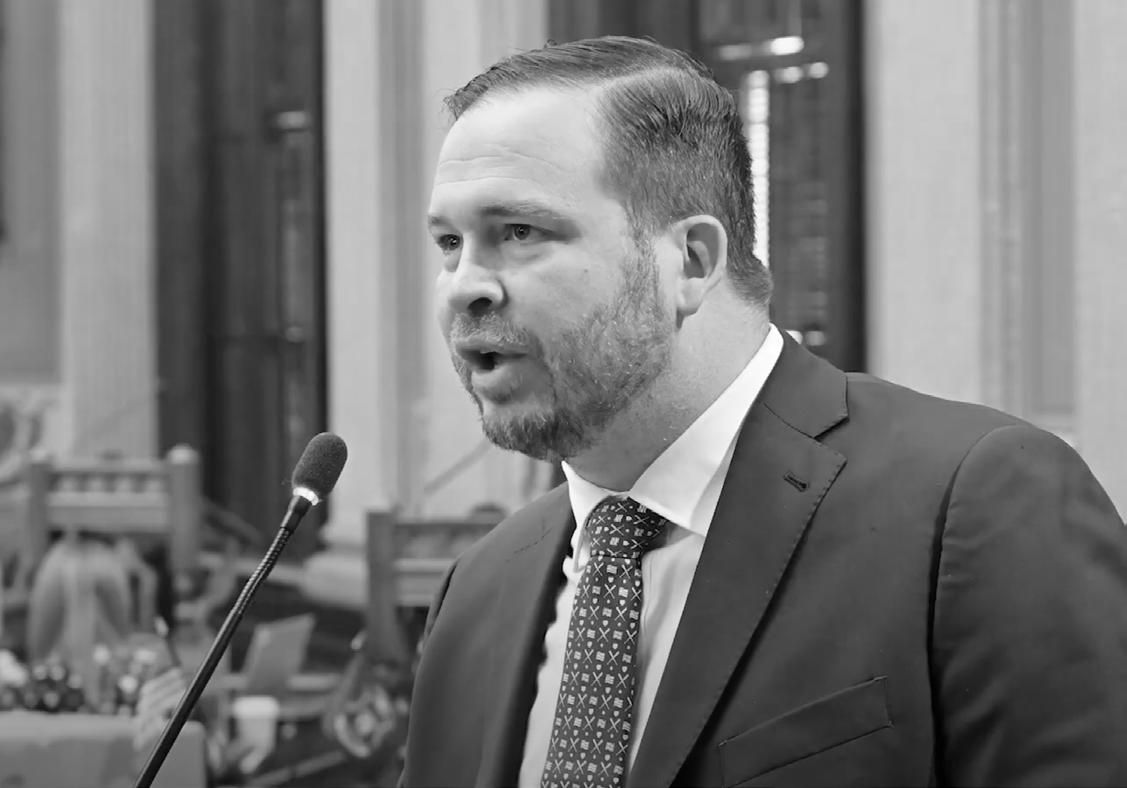
“The issue we have in Michigan is that we have a highly liberal Supreme Court,” Wortz told The Collegian. “They’re gonna side with the ElliottLarsen Act. So legislatively, we’re stuck.”
According to Wortz, the first step is to repeal the ElliottLarsen Act.
“There’s enough support in the House, and I’m sure we could repeal the Elliott-Larsen Act and qualify it back to what the intention of it was, which was actually to protect growth in women’s sports, competitions, and to protect from discrimination,” Wortz said.
Repealing the act will prove difficult though, Wortz said. It is unlikely the Senate will follow suit, nor will it get a signature from Michigan Gov. Gretchen Whitmer.
Although the executive order does not concretely change any rules in Michigan without legislative action, the federal government can withhold funding from schools that refuse to follow the order, according to Bellino.
“By the MHSAA allowing men to continue to play in women’s sports, schools that field these players may lose all access to federal funds,” Michigan Sen. Jonathan Lindsey, R-Coldwater, said in a statement. “The order handed down by President Trump says: ‘It is the policy of the United States to rescind all funds from educational programs that deprive women and girls of fair athletic opportunities, which results in the endangerment, humiliation, and silencing of women and girls and deprives them of
privacy.’ This language is clear and should be taken seriously.”
The Department of Education can withhold federal money that funds bussing, free lunch programs, and large portions of school budgets, according to Wortz.
In the midst of legislative and legal battles, Wortz said that due to a lawsuit from the parents’ group Moms for Liberty against the Biden administration’s attempts to change Title IX regulations, a law that prohibits discrimination based on sex, state and MHSAA rules may not apply.
“If any parent in any school district nationwide is a member of Moms for Liberty, then that district cannot impose the Title IX changes until their Supreme Court has a hearing on it,” Wortz said. “I think there are a couple hundred schools in Michigan that are then put under that protection because we as moms are members, and therefore our kids are protected under that.”
Biden’s attempted changes to Title IX included a redefinition of “sex” to “gender identity,” a change intended to be more inclusive for transgender persons, with potential implications for allowing transgender athletes in women’s sports.
Wortz and Bellino both echoed the importance of protecting women’s sports.
“It’s one thing when you have youth soccer,” Wortz said. “But you start to see at 8 years old and beyond the power a boy has versus a girl, and the danger that can have on girls competing in the same sports.”


Chick-fil-A takes shape: A new location in Jackson on North West Avenue and West Argyle Street will open this spring.
Colman Rowan | Collegian
Hillsdale Township mulls ban on broken-down cars in yards
By Olivia Pero Outreach Director
Local residents will be banned from parking broken-down vehicles in their yards, under a proposed ordinance drafted by the Hillsdale Township Board and the Hillsdale Township Planning Commission.
Some residents of Hillsdale Township — which covers an area surrounding the city limits — have been accumulating broken-down vehicles in their yards and using things like boats, box cars, and semi-truck trailers as storage units, according to Hillsdale Township Planning Commission Chair Joe Sanford and other township officials. This devalues neighbors’ property and the property those vehicles are on, according to Hillsdale Township Clerk Janel Stewart.
“When you have a property that has so much sitting around on it, it has a way of devaluing property around it,” Stewart said. “We’re just trying to come up with a solution for our residents.”
vehicle storage ordinance to address the vehicle issue.”
There was a piece of property in Hillsdale Township that had an excess of eight vehicles on its property, according to Stewart.
“Some were burned, some were dismantled, they were stored near standing water, and the whole property was an eyesore,” Stewart said. “We went through quite a bit with the court system to try to get that cleaned up, and that was under the old zoning ordinance.”
Stewart said the township was able to obtain the order that it needed to be able to go in and clean up the property.
“The way the new zoning ordinance is now, we don’t have the teeth to do that,”
According to Sanford, the planning commission made the ordinance specifically so two things are excluded from being banned: First, salvaging parts from cars hidden from view in a garage, behind a fence, or in a wooded area, and second, agricultural tractors and equipment that are used in a farming operation.
“In other words, you couldn’t have a bunch of tractors sitting around in a residential development like a suburban area, but if it’s actually being used in a farming operation, then all farming equipment is excluded from this, which in a rural township such as Hillsdale is logical,” Sanford said.
“Some were burned, some were dismantled, they were stored near standing water, and the whole property was an eyesore.”
According to Stewart, the ordinance gives the township the enforcement power to eliminate eyesores and maintain good property value in the township. Stewart said the ordinance came before the township board at its Feb. 11 meeting.
The board then sent a memo to the planning commission for review, Sanford said. The planning commission will be reviewing the ordinance between now and its March 17 meeting, he said.
It’s possible the ordinance will return to the township board in March, according to Stewart, but it’s currently still in the drafting stage as the township board and planning commission keep passing the ordinance back and forth as they work to write exactly what they want the ordinance to convey.
Stewart said from a legal standpoint, if the township doesn’t have an ordinance like this in place, then it’s unable to help property owners who are concerned about their property being devalued due to vehicle accumulation in their neighbors’ yards.
“One of the reasons we’re looking at this ordinance is because in 2022 we adopted a new zoning ordinance, and in that zoning ordinance it does not address vehicles or vehicle storage,” Stewart said.
“So we need this additional
Stewart said.
Sanford said the planning commision prepares the zoning ordinance, and the vehicle ordinance is a responsibility of the township board. The township board, however, asked the planning commission to develop the vehicle ordinance since the planning commission recently revised other ordinances, he said.
“So we’ve been working on it for a year,” Sanford said. “It took several revisions.”
Sanford said the township board doesn’t feel it must have an inspector going around scrutinizing everybody’s property.
“It’s just when we get complaints,” Sanford said. “We had a number that were problematic.”
Sanford said rather than proactive enforcement, it’s reactive enforcement.
“I think that’s good because nobody wants to have their property closely scrutinized,” Sanford said.
The problem is not when somebody has a vehicle that broke down and it sits in their yard for a few days until they get the part to fix it, he said.
“The problem is when vehicles sit in peoples’ yards for a long time,” Sanford said.
Every issue has a given timeline, according to Sanford. “If we were to get complaints about your property and went there, it isn’t like, ‘Well tomorrow they gotta be gone,’” Sanford said. “A lot of times — not always, but a lot of times — you get 30 days to get this resolved.” Sanford said the current zoning enforcement officer — Wayne Rurka — is a certified law enforcement officer, so he gives a lot of latitude.
“The township isn’t over enforcing stuff,” Sanford said. People can hire wrecker services to haul away their vehicles to a holding area where it won’t be in the township, according to Sanford.
“There are people that will buy, in some cases, junk for the scrap iron or for the parts,” Sanford said. “So there’s a lot of ways [to remove vehicles from yards].”
Township Board Trustee and Planning Commission Liaison Tim Wilcox said neighbors simply don’t want to look at vehicles sitting in yards. According to Wilcox, the township board has worked to solve the zoning issue while still addressing the issue of vehicles that need to be cleaned up.
“With a zoning ordinance, that will be able to take care of these complaints that neighbors are having with these issues,” Wilcox said.
Sports Feature
Softball coach sets school wins record
By Jillian Parks Editor-in-Chief
Kyle Gross knew he was just one victory away from becoming the winningest softball coach in Hillsdale College history, but said he forgot about it while his team played at a tournament in Hawaii on Feb. 3 — until his players stormed the field and gave him a ball signed by the whole team that had been waiting for him since the final game of last season.
It was his 161st win since being hired in 2018.
“Hillsdale is an amazing college,” Gross said. “The players that I get to work with and recruit, they're amazing young ladies. It's a blessing, with my career — the way it bounced around — to land at a place like this, and then to see this much success, is pretty awesome.”
The Chargers’ softball team had a rather abrupt end to its season last spring, according to Gross. The team also stopped just one win short of Gross claiming the record.
“It has players from last year on it,” Gross said. “We wanted to get the freshmen
Games
Math Maze
Difficulty:

A path starts at the top-left corner and exits at the bottom right, only passing through squares orthogonally. The numbers around the border indicate the number of squares in that row or column that the path passes through. It cannot pass through bolded barrier segments, and it never passes through the same square twice.
Sudoku
Difficulty:

Each row, column, and bolded region contains one each of 1–9.
this year to be part of it, so it'll represent two seasons. Really, the record represents all my seasons, not just last year, not just this year. It was a reflection of seasons past and players that have graduated and gone on.”
Reagan Reese Gensiejewski ’22 played on the team all four years of college and played on Gross’ first Hillsdale team.
“The day Coach Kyle hit 161 wins, me and my teammates spent the night reminiscing via text, facetime, and voice memos on all the wins we were able to experience under his leadership,” Reese said. “Coach Kyle took the time to make us determined athletes, but he also took the time to invest in us as people.”
dings and why we show up for homecoming year after year.
That is why he has the most wins in Hillsdale softball history,” Gensiejewski said. “He is a coach off the field just as much as he is a coach on the field. And there is no doubt in my mind that the grind of being a college coach, even the
an assistant at Kent State University.
After he worked at Kent State, he and his wife moved to Florida, where he launched his own lawn care business and worked as an umpire. One day, he received a call from former Director of Athletics Don Brubacher asking
sions, but I still always felt if you're ever given an opportunity, you can do good things. Thankfully, Hillsdale gave me an opportunity.”
He said he began coaching softball when his daughter started playing in elementary school, balancing the coaching duties with his full-time job as a police officer in Newark, Ohio.

Gensiejewski said while she was a part of 91 of his 161 record-breaking wins, the relationships she formed through softball are what she remembers most.
“That’s why I still text him when I accomplish something post-grad and why he’s at all of my teammates' wed-
frustrating losses, are W.E.B. (worth every bit).”
Gross started his collegiate career coaching NCAA Division I softball at the University of Toledo. He also worked at Walsh University and Presbyterian College. His last coaching position, before coming to Hillsdale, was as


Noughts and Crosses


if he was interested in applying for the job at Hillsdale.
“I always believed in myself. You believe in yourself no matter what you do, whether it's coaching or anything else, and you just want an opportunity,” Gross said.
“I chased those opportunities and maybe made wrong deci-
“At that time it was, it was my outlet. In that line of work, most of my day was negative. You're dealing with negative things all day long,” Gross said. “And softball was just a different world.
I stepped into the softball world, and the players I dealt with, the families I dealt with, it was all just completely opposite that. And so I loved softball.”
Gross reflected on one of the team’s most memorable wins: a last-minute comeback against the University of Findlay in 2022. Despite being down in the last inning, Gross said he had a calm sense that they were going to win.
Track and Field
“Sometimes, as a coach, and maybe as a player, you just know. Even though it didn't look good, we were down by two or three runs, I was calm inside the box,” Gross said. “This feeling came over me like, doesn't matter what the score is, doesn't matter if this batter doesn't get on base and we're one out closer to the game being over. I just knew we were going to win by just looking at the players.”
According to senior pitcher Joni Russell, Gross’ excitement and love for the game, along with his unwavering belief in his players, plays a crucial role in the team’s success.
“When we brought him the signed ball with every girl’s name on it, it reminded me of all the amazing experiences and memories I have because of softball, because of coach Kyle,” Russell said. “If it weren’t for him, I wouldn’t be playing the game I love and enjoying it so much. I’ve always loved the game of softball, but coach helps me love it a little more and I’m so grateful to have him as my coach.”
Weekend meets yield eight provisional qualifying marks
By Joshua Mistry Collegian Reporter
Senior Ben Haas won his third Great Midwest Athletic Conference Field Athlete of the Week award as the Chargers competed at the Grand Valley State University Big Meet and the Robinson Family Open at Tiffin University Feb. 14-15, earning eight provisional qualifying marks.
At GVSU in the field, senior Reese Dragovich placed 10th in the 800-meter run with a new season best of 2:10.20, moving her up to 18th in NCAA Division II. Dragovich also teamed with junior Francesca Federici, sophomore Zoe Burke and senior Josee Behling to place fourth in the 4x400-meter relay with a time of 3:48.23 that moved the Chargers relay squad up to 26th nationally.
Freshman Evyn Humphrey placed 11th in the mile with a time of 4:49.31, a provisional mark and the 19th fastest time in DII. Junior Lucy Minning placed eighth in the 60-meter dash with a time of 7.62 seconds, another provisional qualifying mark. Minning also placed fifth in the 200-meter dash in a provisional qualifying time of 24.60. Sophomore Eleanor Clark ran a personal best time of 18:25.25 in the 5-kilometer.
Senior Richie Johnston took sixth in the 3,000-meter run with a time of 8:13.88, a personal best and provisional qualifying mark. Junior Gabriel Phillips placed 12th in the 5-kilometer with a personal best time of 15:08.95.
Junior Mark Masaka placed seventh in the 800-meter run with a personal best time of 1:55.04.
"My race went really poorly for me but I still managed to run a personal best, so I’m excited to see what I can do for the confer-
ence championship," Masaka said. "I had injuries I was dealing with from the end of the cross country season to around 2 weeks ago."
Freshman Sarah Chappelle placed 16th in the 60-meter hurdles with a time of 9.08. Chappelle also placed second in the 60-meter hurdles at the Robinson Family Open with a time of 9.11.
"At Tiffin on Saturday, I ran an 8.98, which felt sort of slow, but in the finals, I was running much better,"

Chappelle said. "Because the race was quick and fast, I'm feeling super excited and ready for the conference championships."
In the field, Haas won the weight throw with a new personal best of 22.45 meters, beating three of the top five performers in NCAA DII. Haas also took second in the shot put behind the defending national champion with a throw of 17.77 meters, a provisional qualifying mark. Senior Katie Sayles placed seventh, setting a new personal best in the shot put with a throw of 13.66 meters.
At Tiffin on the track, freshman Aubrie Wilson placed eighth in the 400-meter dash with a new person -
al best of 1:05.79. Freshman Zealand Tarrant placed second in the 800-meter run with a time of 1:59.53. Freshman Evelyn Overlease won the 400-meter dash with a time of 1:01.19. In the field, Junior Tara Townsend won the pole vault with a top clearance of 3.80 meters. Freshman Gianna Lodice won the long jump as well for Hillsdale with a new personal best of 5.20 meters, followed by freshman Katie Kennedy, who placed second with a jump of 5.19 meters. Senior Reagan Dahlquist placed second in the high jump with a clearance of 1.60 meters. Wilson also placed fourth with a personal best clearance of 1.55 meters. Senior Grace Chen placed third in the triple jump with a mark of 10.58 meters.
Senior Cass Dobrowolski won the long jump with a new personal best of 6.71 meters. Junior Connor McCormick won the pole vault with a mark of 4.70 meters.
Junior Christian Hinrichs placed third in the triple jump with a new personal best of 12.53 meters, and also placed eighth in the long jump with a mark of 6.03 meters. "I made a big breakthrough with my triple jump form and hit a small personal record. I was hoping to do better in long jump, but I was having issues getting on the board. My body has been pretty beat from doing football workouts in the morning and track practices in the afternoon, but I love it," Hinrichs said.
The Chargers will host the Hillsdale Tune-Up meet this Friday, Feb. 21 as they prepare for the G-MAC Championships the following week.
Women's Basketball Chargers lose at home to Northwood, beat Tiffin on the road
By Cassandra DeVries Collegian Reporter
Hillsdale women’s basketball lost to the Northwood University Timberwolves at home 85-81 Saturday, Feb. 15, and defeated the Tiffin University Dragons away 65-43 on Thursday, Feb. 13. The Chargers played Northwood for a “Pink Out and Princess Night” in honor of Emerson Sigtryggsson, a Hillsdale student who passed away earlier this academic year.
Though Hillsdale trailed Northwood by more than 10 points for the majority of the game, the Chargers went on a 19-6 run in the fourth quarter and took the lead from Northwood at 81-79 with 1:34 left on the clock.
Northwood tied the game 81-81 with two free throws after a steal. They then made a layup and sunk two more free throws before the buzzer sounded to win the game.
Senior Lauren McDonald scored 23 points, with three
Sports Feature
assists, three steals, and eight rebounds for the Chargers. Freshman Ellie Bruce made two career records with 18 points and 10 rebounds.
Senior Caitlin Splain had 10 points, including two from beyond the arc to break the women’s basketball program’s all-time record for 3-pointers.
Splain reached 239 3-pointers, surpassing Chelsea Harrison who recorded 237 3-pointers from 2008 to 2012.
“It was definitely surreal. This was something I had
worked for since I stepped on campus,” Splain said. “I’m so thankful that I even had the opportunity to reach this milestone. I wouldn’t have achieved it without my teammates and coaches' constant support.”
On Thursday, the Chargers defeated Tiffin 65-43.
The Chargers used a fullcourt press to undermine Tiffin’s offense in the third quarter and grew their lead from 7 to 17, according to McDonald.
“Using the press forced Tif-
McDonald reaches 1,000 point milestone
By Francesca Cella Collegian Reporter
Senior Lauren McDonald
scored her 1,000th collegiate career point with a left-handed layup in an away game against the Kentucky Wesleyan College Panthers Feb. 8.
“I knew it was coming, but I didn’t know it was such a small amount of points away,” McDonald said. “I thought it might not happen that game.”
She made her final basket on an “and one,” with an opposing player fouling her as she went in for a layup.
The team was prepared to celebrate McDonald’s achievement, with papers saying “1,000 points” dispersed among the crowd and cookie cake for afterwards. McDonald’s parents were also in attendance and celebrated with her, McDonald said.
Junior Payton Adkins said the team was watching carefully as McDonald approached the milestone.
“We all kept waiting, picking up and setting down our papers for the 1,000 points, and then when she did we all started cheering for her and holding our papers,” Adkins
said in an email. “What was even cooler is for the most part the opposing teams’ fans also stood up and clapped for her, respecting how impressive of an achievement it is.”
A transfer from the Air Force Academy, McDonald joined the team in the spring semester of her sophomore year, according to head coach Brennan. Although she could have delayed playing for a semester and stayed on the team for a fifth year, McDonald jumped in right away.
“It was literally her third day on Hillsdale’s campus and we were leaving for a team trip to Puerto Rico, and she hopped on the bus with us, hopped on the plane with us, and essentially went to Puerto Rico with strangers,” Brennan said.
Not only did McDonald immediately fit in with the team, she also filled an important position on the court, according to Brennan.
“When she joined us she actually had to transform her game to being our point guard because we really didn’t have one,” Brennan said.
Today, McDonald is the starting point guard as well as the leading scorer for wom-


en’s basketball, Brennan said.
“She truly has the clutch gene, and so whenever we need her to take over or need a bucket down the stretch, she just loves to have the ball in her hands,” Brennan said. “She really thrives with that pressure on her.”
Following close on the heels of her senior teammate Caitlin Splain, McDonald became the 22nd woman in Hillsdale College basketball history to score 1,000 points.
“It’s a really big deal,” Brennan said. “In today’s day a lot of athletes are doing it in five years, but Caitlin and Lauren have done it in four years, which is super impressive.”
Adkins appreciated McDonald’s achievement as a fellow teammate.
“It’s already a hard accomplishment to get in high school,” Adkins said. “Lots of people don’t get it then, but then to come to college where everyone was the All-American on their high school team and be able to get it against that high level of competition is even more impressive.”
Adkins and Brennan both said McDonald focuses on the team.
“What I most admire about Lauren is how she is one of the greatest players in the conference but yet the most selfless,” Adkins said.
on the court,
up her team, according to Adkins.
“Lauren is constantly looking not at points but at her teammates,” Adkins said. “You can see this just through her stats: she leads the team in almost every category, including assists, since she’s always looking at how to best set up her teammates to score.”
When McDonald’s not on the court, she’s cheering on her team, according to Brennan.
“She’s always the first one to celebrate her teammates,” Brennan said. “We tease her because after every point that she scores or her teammates scores, she does this little clap thing. It’s the cutest.”
After graduating, McDonald said she hopes to pursue a position as a graduate assistant coach in basketball.
“I obviously love basketball and I just want to get more experience on the logistics side of it to see if I really enjoy coaching, or if I want to do something else.”
In the meantime, McDonald said she has work to do for the team.
“I want to win the conference tournament,” McDonald said. “That’s my big goal.”
fin to have a lot of turnovers,” McDonald said.
Hillsdale continued to dominate throughout the fourth quarter and finished strong, forcing 19 turnovers and beating the Dragons in rebounds 49-37.
Splain led the Chargers with 16 points, three rebounds, four steals, and three assists.
McDonald had 13 points, five rebounds, and three steals.
Popplewell contributed 14 rebounds, a career record.
The Chargers are now 13-4
in conference games and 16-8 overall with three games left in their regular season. They remain in third place in the Great Midwest Athletic Conference.
Hillsdale will next play the University of Findlay Oilers away on Thursday.
“Findlay is a huge game for us,” McCormick said. “We need one more win to have a first round home game in the conference tournament so we are pumped up for that.”
Women's Tennis
Chargers split matches at home
By Tayte Christensen Assistant Editor
The Hillsdale women’s tennis team won its match against the Davenport University Panthers and dropped its match against the Ferris State Bulldogs at home this weekend.
The Chargers faced off against Davenport Feb. 15 and went 4-3.
Hillsdale swept all three doubles pairs, with No. 1 doubles sophomore Ané Dannhauser and senior Courtney Rittel winning 6-1.
In No. 2 doubles, senior Libby McGivern and junior Briana Rees pulled off a 6-4 win.
“We had a great match as a team on Saturday and I think that had a lot to do with how we came out super strong in doubles and started off the singles play already in the lead,” McGivern said.
In No. 3 doubles, juniors Megan Hackman and Bella Spinazze cruised to a 6-0 victory over Davenport.
“Megan and I make a great team,” Spinazze said. “We feed off of each other’s energy and have a lot of fun together on the court. We both know how to boost each other up when we need it and our game styles complement each other well.”
Singles against the Panthers were a mixed bag, with the Chargers winning three of the six matches.
At No. 2 singles, McGivern pulled off a win against the Panthers, dropping one set but walking away with a 6-2, 3-6, 7-5 victory.
“Overall the team did great in singles and we had awesome energy all around,” McGivern said. “I had a really tough three-set match and I would not have been able to
come out on top if it hadn’t been for the support of my teammates and coaches.”
Rees had another singles victory for the Chargers at No. 3 singles, sweeping Davenport 6-2, 6-1. The Chargers’ third singles victory came from Hackman at No. 6 singles, who went 7-5, 6-1. On Sunday, the Chargers broke their three-game winning streak and fell to Ferris State 6-1.
The only win for the Chargers in doubles came from Dannhauser and Rittel’s 7-5 success. No. 2 doubles Rees and McGivern and No. 3 Spinazze and Hackman fell short against the Bulldogs, 6-1 and 7-5, respectively.
“Courtney and I worked great together, and on Sunday we managed to keep that going,” Dannhauser said. “Sunday’s match was definitely harder but we kept our cool and finished it off strongly.”
Dannhauser continued the Chargers’ brief winning stint against the Bulldogs and had the only singles win of the day, defeating Ferris State 6-3, 6-0.
“My singles matches on Saturday and Sunday were worlds apart,” Dannhauser said. “I played so much better on Sunday and really enjoyed it. I loved the energy the team had this weekend, even though Sunday didn’t end up the way we wanted it to.” In their singles matchups, No. 3 Rees and No. 6 Hackman played their opponents to three rounds, but ultimately fell short.
The Chargers now sit at 3-2 on the season and will face Purdue University Northwest and University of Illinois Springfield on the road Feb. 22 and 23.
Josee Behling, Track and Field Charger chatter
Compiled by Isabella Doer
What’s your favorite memory with your teammates?
At nationals my sophomore year, our coach was crying because it was the final race of his coaching career. He let us paint blue glitter stripes across his cheeks to give him a ‘ferocious’ edge. We ended up breaking the school record.

What’s your guilty pleasure TV show or movie?
My go-to movie is the version of ‘Pride and Prejudice’ that features Keira Knightley.
What's one fun fact about you that most people don’t know?
I love playing pickleball (I suck).

Swimming
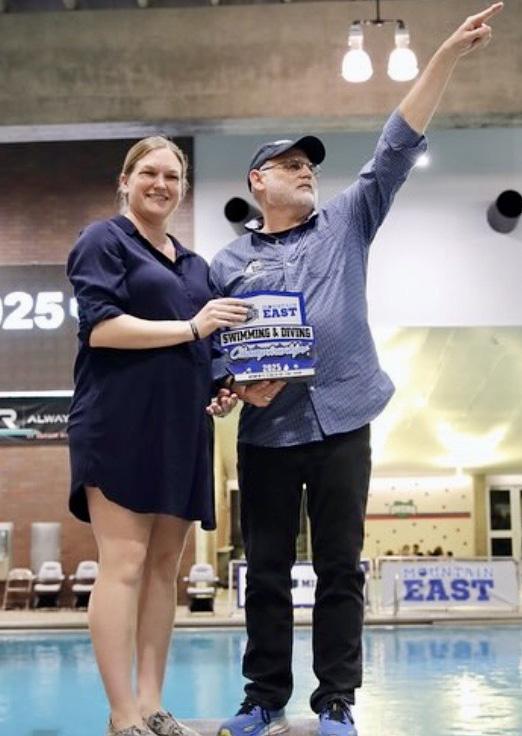
Charger Sports

Mason dominates as women place second at conference
By Ty Ruddy Assistant Editor
Senior Elise Mason
claimed three conference titles and head coach Kurt Kirner won his fifth Coach of the Year award last week at the Great Midwest Athletic Conference meet as the Chargers swim team earned its third straight runner-up finish in the conference with a score of 1414.5.
During her first three years as a Charger, Mason won every conference title race in the 500-yard freestyle, 1,000-yard freestyle, and the 1650-yard freestyle.
Shotgun
She completed her four year reign as the 2025 G-MACs wound to a close last week, once again winning conference titles in all three events.
Two other Chargers swam top-10 times in the 1650yard freestyle, sophomore Izzy Ondracek in eighth with a time of 18.02.97 and junior Jamie Parsons in ninth with a time of 18:04.74.
“During G-MACs our team is very good at being there for each other and showing Charger spirit,” Parsons said. “Our support for one another helps us perform to the best of our abilities and make it through four
physically draining days.”
According to Kirner, senior Megan Clifford succeeded in her quest to qualify for NCAA Division II nationals in the 200 yard butterfly. She also hit a national qualifying mark in a time trial for the 100-yard butterfly on day one of the meet
The Charger 4x400-yard freestyle relay of Clifford, senior Lucia Rutchi, sophomore Alyson Early, and freshman Ella Shafer broke a team record with a time of 3:30.58, which was good for second place in the meet. In the same race, Clifford hit a national qualifying mark as
the lead leg in the 100-yard freestyle, punching her ticket to nationals.
Additionally, Hillsdale claimed two podium finishes in the 200-yard breaststroke with senior Joanna Burnham taking runner-up honors in 2:24.53, just out-touching sophomore Lauren Kamp, who took third with 2:24.65. I am so proud of how we performed at G-MACs. So many people swam best times and really gave it their all,” Mason said. “It makes me so proud to be a part of this team.”
Although many Chargers ended their season last week,
Four Chargers selected for Team USA
Shotgun from A1
Competitors looking to make Team USA shot 500 total targets split between two separate matches, according to skeet shooter Sapp. The top six scorers from each category made the team.
“I have been shooting shotguns since I was 8 years old. I used to go out with my dad and uncle almost every weekend,” Downs said. “When I was 16, I signed up to go to a camp to learn how to shoot international bunker trap, which is what I do now, and I fell in love with it there. I've been competing in USA shooting ever since. When I was 18, I made my very first junior team, and I made the Junior World Championship team to go to South Korea.” Dale said she never would have joined the Hillsdale shotgun team if she hadn’t watched her sisters succeed in the sport when she was young. She now hopes to compete in the 2028 Summer Olympics.
a few await the final field for the NCAA DII Championships to be announced on Feb. 26. Clifford and Mason are expected to make the cut for nationals. Both have competed at the national meet in previous seasons, and both have earned All-American honors for their performance. The national meet will be hosted in Indianapolis, Indiana, from March 11-15.
Kirner praised the Charger swim team for its success and dignity throughout the season.
“For me to get my 5th Coach of the Year award in
Men's Tennis
the last few years is more a testament to the great character and competitive reputation of our team,” Kirner said. “We are known for our ‘never quit’ tenacity and our upbeat, supportive and congratulatory approach to all teams and competitors. I’m always proud of what others convey about the character of our Chargers. It has been a marvelous year.”

career and improve enough to hopefully make it to the Olympics.”
Earning a spot on Team USA allows the shooters to
pletely different,” Sapp said.
“A huge thing is just getting accustomed to the food and the way people live out there. It was the first time I ever left the country and it was an eye opening experience.”


“My two older sisters shot in college, and my older sister went on to shoot on the Army team,” Dale said. “Seeing them be -
ing so successful in it and following their dreams, I was like, ‘Hey, maybe this is also an opportunity for me.’ So throughout high school, I was always working toward trying to get a scholarship or trying to go somewhere so I could continue my shooting
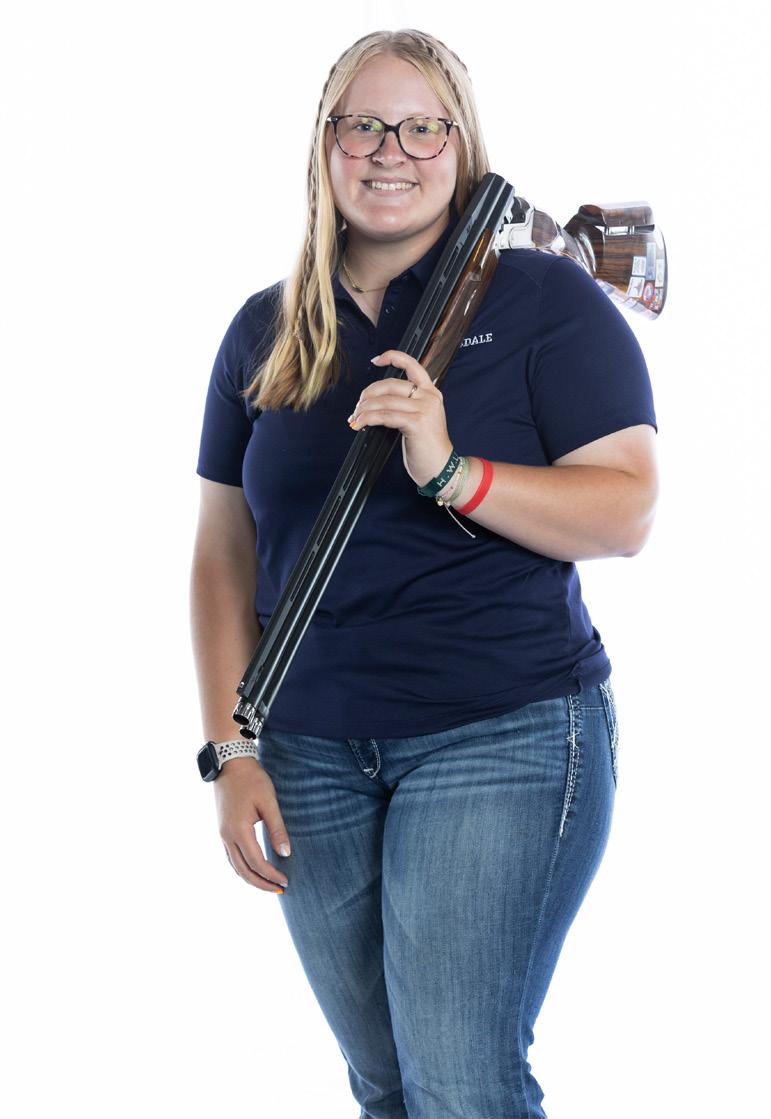
compete around the world in countries such as Argentina and Peru, according to Sapp.
“All the ranges look com -
Sapp said the competition was tough but he knew he had it in him to shoot a top score.
“I expected to go out there and do it,” Sapp said. “It was cool though because to be up there with the older guys, and the guys in the Army, whose whole job is just to make that team and make the Olympics, was pretty cool.”
Similarly, Downs said she had worked hard to get where she was and felt ready to take her spot on the team.
“It was kind of surreal because I went into the last day knowing that if I wanted a spot on the open team I was really going to have to just shoot very well my last day, and I couldn't leave anything on the table,” Downs said. “So then I shot, and I shot the best I ever have on a day of a match ever, on day three, which was our last day, and that solidified my spot.”
Chargers drop pair of regional matches at home
By Jamie Parsons Collegian Reporter
The men’s tennis team lost two home matches against top-ranked teams in the Midwest region over the weekend, falling to 1-4 in the season.
The Chargers fell to the Davenport University Panthers 6-1 Feb. 15, losing the doubles point and five of the six singles matches.
Sophomores Henry Hammond and Ellis Klanduch secured a win against Davenport at No. 1 doubles with a score of 6-2, but the Chargers lost the doubles point against the Panthers after suffering a defeat at No. 2 and No. 3 doubles.
Head coach Keith Turner said Hammond and Klanduch have a good dynamic and won their match by returning serves well after the first game.
“They’ve been playing together since the fall and have grown comfortable as a team,” Turner said.
At singles play, freshman Eddie Bergelin won at No. 5 singles with a 6-3, 6-4 victory, gaining Hillsdale its one and only point of the match.
Freshman Rintaro Goda was close to winning a point for Hillsdale at No. 6 singles, pushing his opponent to a third set, but losing in a 3-6, 6-1, 3-10 defeat.
Goda said he is still getting used to playing in dual matches but has more confidence than he did at the beginning of the season.
“I still feel a ton of pressure especially before get -
ting on the court; however, once I’m on the court, I feel more comfortable going for my shots and playing under pressure,” Goda said.
The Chargers lost 5-2 against the Ferris State University Bulldogs Feb. 16, losing the doubles point and four of six singles matches. At singles play, freshman Alejandro Lopez-Cordero pushed his opponent to the third set at No. 3 singles, securing a 6-4, 4-6, 1-0 victory. Freshman Samuel Plys also secured a win for Hillsdale at No. 6 singles with a 6-2, 6-1 victory.
Goda said he enjoyed competing against Davenport and Ferris State because it made the team better.
“It was great playing against some of the top teams in the G-MACk,” Goda said. “It really revealed our weaknesses, allowing us to become better for our next match.”
Director of Athletics John Tharp encourages students to come watch the men’s tennis team play at home because it is entertaining but also motivates the players to be better.
“It is a joy to watch your classmates compete at a very high level of tennis,” Tharp said. “The matches are intense, and support will only inspire our student athletes even more.”
The Chargers will go on the road to Indiana this weekend to play Goshen College Feb. 22.
C U L T U
Lost Mary to release single amidst growing popularity
By Anna Broussard Assistant Editor
While Hillsdale County has rapidly changed over the years, it has kept the quiet simplicity of most Midwestern towns — at least according to alumni band Lost Mary’s new song “Vintage Ford.”
“Vintage Ford” follows a single the band released last year, part of the new album that is set to be completed in the

cording to band members Luke Martin ’16 and David Johnson ’16.
“We released a single in December that wasn’t going to be a single at all, but it was the first one that was ready and had already been mastered,” Martin said. “We wanted to keep going with the algorithm for Spotify, since our numbers were up, so we wanted to capitalize on it and release ‘Vintage Ford’ as a single.”
towns across the Midwest, Martin said.
“The songwriting process was about pulling out the nostalgic aspects of Michigan, because we’re a rural town, and yet, things are always happening,” Martin said. “Technology keeps advancing, progressing, and ‘Vintage Ford’ is almost like a call back to the old.”

Orchestra to play this weekend
By Christina Lewis Assistant Editor
Picture rugged mountains, coarse sand, and salty sea waves as they crash against the rocks. This is what Felix Mendelssohn encountered when he visited the Hebrides, an island chain off Scotland’s west coast. Hillsdale’s symphony orchestra will perform the German composer’s translation of his experience, “Die Hebrides,” at its Saturday concert.
The orchestra will also perform pieces by Edvard Grieg and Ludwig van Beethoven at the concert, starting at 8 p.m. Junior Hannah Wong, winner of this year’s concerto competition, will join the orchestra and play the piano for the third movement of Grieg’s “Concerto in A Minor.”
“I’m not sure how to feel because this is my first time playing with a live orchestra, and I’ve never done it before,” Wong said. “I’ve done a few rehearsals, and it’s definitely coming together.”
Orchestra Conductor James Holleman said he picked this year’s program specifically because of the instrumentation. Since the college’s jazz band will be traveling to the Elmhurst Jazz Festival in Illinois, the orchestra will have a smaller trumpet section and the trombone section will be gone.
“This was a great opportunity to do late classical music,” Holleman said. “So we’re doing Beethoven. I love to do Beethoven. It’s really important to do. He’s brilliant. It’s just that he rarely calls for trombones, tubas, and a lot of percussion.”
Junior Elena Bull said she is excited to play more classical songs at the upcoming concert.
“The program is pretty standard classical, which is not something we usually do, but I really like the music, and the structure follows the typical overture, concerto, symphony, format,” Bull said. “People are so interested in branching out
of that now that nobody actually still does that. I’m glad that we’re doing something so traditional, and I think it’ll be pretty well received, just because who doesn’t like Beethoven?” Bull recommended concertgoers to look up a picture of the Hebrides, a group of islands on Scotland’s west coast, before the concert.
“The song is very pictorial,” Bull said. “You can picture mountains and ocean waves.”
Holleman said it is rare to see the quality of a symphony orchestra at a school as small as Hillsdale.
“People should come just to embrace the fact that we have this live animal, this symphony orchestra,” Holleman said. “A lot of cities in this country are losing funding for orchestras. It takes a lot of money to support an orchestra in a community.”
The concert should end around 9:30 p.m., according to Holleman.
“The concert is a nice opportunity to slip out and attend something,” he said. “The students are so busy, and they’re so loaded with their academics, to just go sit in this magnificent building, this chapel that we have, and take in this orchestra concert. I think it’s such a break from studying. It’s such a break from everything else they’re doing.”
Holleman said that students should take advantage of having an orchestra concert to attend that does not cost a penny.
“Nobody on this campus, if you live on campus, is more than five minutes away to walk over, take in a concert, and then go on about whatever else they were doing. It’s so easy,” he said. “If you’re in a large city — parking, getting tickets, expensive tickets — it would be several hours of having to leave your house, get there, do everything, come back. Where, here, you can just slip out, go up and hear this concert, see your friends on stage, and then go about your Saturday night.”
Martin and Johnson said the song highlights the beauty of tradition in rundown towns because this atmosphere built those towns.
According to Johnson, Lost Mary intends to continue releasing a few songs at a time in order to gain followers based on the Spotify algorithm.
“Nowadays, with streaming it’s good for the algorithm to just keep releasing singles, as opposed to just dumping it all up,” Johnson said.
“Vintage Ford,” although intended to be the band’s first release, follows a few months after the release of “Pere Lachaise,”
according to Martin.
“‘Vintage Ford’ was going to be the original first on the album, but that one just was not finished,” Martin said. “I wrote it maybe a-year-and-a-half to two years ago, and the demo version is a lot different than the version we have now, but they both have their places.”
Martin, who writes and composes most of Lost Mary’s songs, said the inspiration for songwriting can be challenging and takes a significant amount of time.
“The lyrics take the most amount of time. Sometimes it’ll take me 12 hours to come up with two lines. It’s a very painful process,” Martin said. “It’s about trying to create something that holds together well. We’ve heard so many bands with crappy lyrics — it’s a great melody, but the lyrics just fall short.”
The duo said they produce their music in Canada but record demos and do final touches in their Hillsdale studio.
“We recorded ‘Vintage Ford’
up in Canada with our producer this past summer, and then our producer sits on the songs for a couple months — because everyone’s sick of the songs by that point — we usually let them marinate a little bit then he sends us back the mixes,” Martin said. “Then we will come back here and record the over dub in case certain elements sound better in our studio.”
Johnson said the lyrics of “Vintage Ford” stand out in the album with a happier tone and lean into a more coun try genre which has dif fered from their previous releases and their next album.
“It almost sounds like a cheesy country song, but it’s not country,” Johnson said. “This is a happier song on the album because it is a sadder album, they are generally upbeat but have a central message that
“Everyone
change, but there are some beautiful things in the past,”

Whalen to perform at Dawn
By Isaac Green Managing Editor
Six months after releasing his first EP “American Deployed,” senior Greg Whalen will perform 18 original songs at Hillsdale’s Dawn Theater this weekend.
Whalen will perform the concert, “An American Story,” Feb. 28 from 7 to 9 p.m. and it will reflect Whalen’s journey over the last eight years from joining the Marine Corps, serving his country in Afghanistan and elsewhere, and finally transitioning out of the military.
“As I was writing these, I wasn’t planning them to be this kind of narrative,” Whalen said. “That’s just what they’ve kind of turned into since they’ve been these moments of reflection through music over the past seven years.”
Joining Whalen on stage will be “The Ramblers,” a collection of local musicians from, including Luke Martin and Da-
vid Johnson of the folk duo Lost Mary.
The Dawn Theater will begin selling alcoholic beverages at the bar when the doors open at 6:30 p.m. Whalen will also have a table with merchandise available.
According to Whalen, the concert began to take shape when Chair of The Friends of the Dawn Theater Mary Wolfram reached out to him regarding a grant from an organization called Michigan Humanities that could finance the event.
“This is their touring grant specifically designed to encourage performances by Michigan artists, especially in rural areas,” Wolfram said. “We are also receiving support for this concert from local business Hillsdale Renaissance, owned by Hillsdale grad Luke Robson ’17.”
After hearing of Whalen’s success with his first EP, Wolfram said she began talking with him about a performance
at the Dawn.
“Greg’s music is beautiful, in and of itself,” Wolfram said.
“Let’s just say, it is easy on the ear. But it is also meaningful. I grew up and graduated in the 1970s, during the end of the Vietnam War, so Greg’s music reminds me of the protest songs that spawned the folk rock movement in that era.”
Whalen released his EP last August, three days before the third anniversary of the suicide bombing at Abbey Gate that killed 13 U.S. service members during the military withdrawal from Afghanistan. On Sept. 28, he opened a concert for Five for Fighting in Corning, New York.
Adjunct Instructor of Music
Dan Palmer, who played the mandolin on Whalen’s EP, will be one of the musicians joining him on stage. He said that he is looking forward to hearing Whalen speak in between songs about the experiences that inspired his compositions.
“It has been such a pleasure
to get to know Greg and his music,” Palmer said. “It has been a fun process of learning the tunes individually and bringing them together to work on arranging. This is the first time that I know of that this music has been played live with other musicians, so the discovery process has been engaging and fun.”
Senior Jack Cote will film the concert, according to Whalen, and the sound engineer will record the entire performance to mix and put out as a live album.
“I am trying to get every last bit of value out of this that I possibly can,” Whalen said. “This is going to give me the material that I need to be able to go to other venues with evidence saying ‘I can actually put on a show, and in fact, I already have put on a show with a band in a theater setting.’”
Those interested in attending can buy tickets for $10 at the door or call (810) 844-1396 to reserve them ahead of time.

‘Shall We?’ student film pops the dating question
By Zack Chen Assistant Editor
“Shall We?” is the most ambitious project Hillsdale’s Film and Production Club has ever undertaken. It took a year of production and editing, it deals with one of the touchiest subjects on

Hillsdale’s campus. Boy oh boy, does it deliver.
The half-hour film on Valentine’s Day, “Shall We?” is the latest addition to the star-crossed lovers genre — it follows Protestant Ethan (played by sophomore Nate Shackelford) and his Roman Catholic President’s Ball date Katherine (played by sophomore Maggie Saffian).
It’s beautifully filmed and full of rich, warmly-colored scenes. Throughout the film, the camerawork is well-executed and engaging: from an intricately choreographed dance scene at Swing Club to close-up focus shots of actors’ faces, “Shall We?” draws viewers into a bright-lit, ballroom vision of familiar Hillsdale. The film’s big question, of course, is that which many generations of Hillsdale students have been forced to confront: can Protestants and Roman Catholics date one another?
The writing, storyline, and acting are convincing — perhaps even convicting. The moment when Saffian casually lets slip that she goes to Mass on Sunday and Shackelford’s world begins to crumble apart is very nearly perfect. I, along with much of the rest of campus, was only too familiar with the Hillsdale trope of the Roman Catholic homeschooled girl meeting a Protestant, smallChristian-liberal-arts-schooled boy. Saffian and Shackelford are graceful, photogenic, and deliciously fundie: the pair expertly skewers their roles as Hillsdale stereotypes.
Many of the questions, dilemmas, and observations that “Shall We?” presents are well known, perhaps even perennial. Like its early cracks at homeschoolers and private-Christian-liberal-arts-ers who had a “Formal Dance” but no traditional high school prom growing up, the film’s presentation of a Protestant boy and a Roman Catholic girl struggling with the
integrity, without which no relationship can well survive.
“Shall We?” reinforces the goods of respect, honor, and even — mirabile dictu — dating. Shackelford’s apology for disrespect in the film’s final scene may be inexorably, delectably fundie, but that doesn’t take away from its merit. Even as “Shall We?” upholds the delicacy (or perhaps overthinking?)
“Dating is serious, ‘Shall We?’ reminds its viewers, but so is courtesy, and a Prez Ball date is far from the estate of marriage.”
question of whether to date one another is familiar to Hillsdale viewers.
Mercifully, “Shall We?” does not attempt to answer the question: the film would lose its magic if it did. It is in no way a polemic — proponents and detractors alike of Protestant-Roman Catholic dating will find scant ammunition here with which to wage war. Instead, the denouement of “Shall We?” is an affirmation of the fundamental goodness of honesty and
which characterizes so much of so-called Hillsdating, it shows that the fundies don’t have it completely wrong.
Dating is serious, “Shall We?” reminds its viewers, but so is courtesy, and a Prez Ball date is far from the estate of marriage. In fact, to blow a first date out of proportion is ultimately to detract from its true importance.
“We must play,” C.S. Lewis wrote in “The Weight of Glory.” “But our merriment must be of
that kind (and it is, in fact, the merriest kind) which exists between people who have, from the outset, taken each other seriously.”
This is the message of “Shall We?” A Protestant boy and Roman Catholic girl may disagree on meritorious works, marriage, and Mary, but it is nevertheless possible for them to make merry on a date without marring the serious sanctity of romance.
The Hillsdale College Film Club has done more than deliver an elegantly-crafted and aesthetically-pleasing half-hour of entertainment in “Shall We?” It has given campus a work of art: imperfect, perhaps, as even Michelangelo’s Pietà must be, but nonetheless valuable, laudable, and worth seeing.
The sheer number of Hillsdale students involved makes the film’s credits impressively long for an undergraduate film. “Shall We?” is the brainchild of junior Charlie Cheng, who wrote, co-directed, and edited the film. By my count of the film more than 50 Hillsdale students and faculty were involved in the final product.
“Shall We?” will have another showing in the Plaster auditorium this Friday, Feb. 21, at 7 p.m. If you haven’t seen it yet — if you’re a pushover for rom-coms, Roman Catholics, or reasonable discussions of the Council of Trent — if you long to see the magic a really good friend in the Lord can bring to life, stop on by for the half-hour showing. Bring a friend, even…as long as he or she is a friend from church.

There are many potential answers to the questions raised by the film: “Shall We?” merely pops the question.
Students ward off cold weather in business casual
By Anna Broussard Assistant Editor
Although students battle negative temperatures, snowstorms, and ice storms over the winter, their efforts to maintain the Hillsdale coined “Monday culture” of business casual attire are unchanged by the frigid weather.
“There is a culture of Monday on this campus, but it’s something that we should be really proud of — we don’t just wear sweats everyday, and that there is an expectation of dignified self presentation,” senior Lucy Griffin said.
Junior Esdras Blackwell said campus cultural attire is distinct and features a wide variety of styles.
“In my experience here, people are very true to where they’ve been raised. You can kind of tell them apart based on their style,” Blackwell said. “It’s like a game, I meet people first and then I kind of sense their style. And I will be like, ‘Oh, is this a West Coast person, or this is a northeast person. It is all because you have this little geographic melting pot here.”
Sophomore Hershey
Athysivam said she is intentional about her outfits throughout the week, especially on Monday.
“I think that the majority of the campus understands that we are Hillsdale College students, and that comes with a certain attitude and professionalism,” Athysivam said. “If there’s any day of the week that you put effort into you should do Monday, because that’s setting your week off straight and right. It’s almost like making your bed in the morning.”
While dressing well throughout the week cultivates a profession al mindset, it is also a way to show respect to your professors and can be rather simple, Athysivam said.
“I think it’s a matter of respect to the professors. and I’ve just noticed that my notes look so much better when I look better,” Athysivam said. “Dressing well is really not hard. It is just a matter of time and care. I think beauty is a choice and so is being presentable.”

Although some are accustomed to the colder temperatures it provides an opportunity to elevate one’s winter style and in a simple way, according to Griffin.
“Winter is an opportunity to add to your outfit. You have the opportunity to layer clothes and use multiple different kinds of colors and textures in the same outfit,” Griffin said. “I think you just have a fun, unique opportunity that you don’t have in the summer because it is frigid outside.”
Griffin said the most necessary staple is a distinct blanket
“First of all, I liked scarves before scarves were cool, but scarves are big
right now, so invest in a nice, warm, big blanket scarf, and it becomes kind of your staple,” Griffin said. “I might see somebody’s scarf in the library, and I know who it is. That becomes your winter personality.”
Senior Jason Lu similarly said the scarf is one of two staples someone needs during the winter time.
“Over winter break, I started wearing a scarf that my girlfriend got me. It is awesome and like a blanket,” Lu said. “Also over-the-ear headphones, this a huge one, I wear them all the time, and I feel like people think I’m being antisocial, but generally I just want to keep my ears warm.”
Lu said the weather can help make dressing up easier.
“Especially for men, it’s all about layering sweaters,” Lu said. “People can wear collars, sweaters, and a winter jacket.”
For Blackwell, winter staples include a scarf and gloves, which he adopted into his style his sophomore year and could not live without.
“Chunky scarves are awesome because the thing is, you can wear as big of a jacket as you want and if there’s air getting in through your jacket
then your wrists, your neck will still be cold,” Blackwell said. “I do love colorful gloves, but I also really love gray and brown ones. I always notice when people don’t have gloves now that I have gloves.”
According to Athysiv am, her staples include a trenchcoat and tur tlenecks to help her to stay warm and look professional when go ing to class.
“I have three trench coats, and they’re brown, gray and black, and I love using them with different scarves, blazers,” Athysivam said. “I think that professional wear is that you can almost lean into the neg ative atmosphere, you can style it by putting on a turtleneck and a blazer with a scarf and then a trench coat and you’re warm, this is a staple recipe for looking good.”

themselves,” he said. “People don’t really like to change that regardless of the weather, especially since a lot of people are accustomed
According to Lu, with pants, boots, jackets, layers, and scarves, dressing for the winter does not change much about one’s personal style.
“What people wear — whether they know it or not — they’re saying something about
In general, the freezing temperatures are a way for students to learn how to navigate the challenges of weather while maintaining serious and professional attire, according to Griffin. “Don’t ever feel self conscious about dressing up,” she said. “Yes, you might attract a little bit more attention when you dress nicely, but it will become your normal. I would say that what we have on this campus, and the culture that we have in expressing our character through how we dress and understand ourselves is something to be proud of as a campus.”
Professors’ Picks: Ian Walsh, assistant professor of chemistry
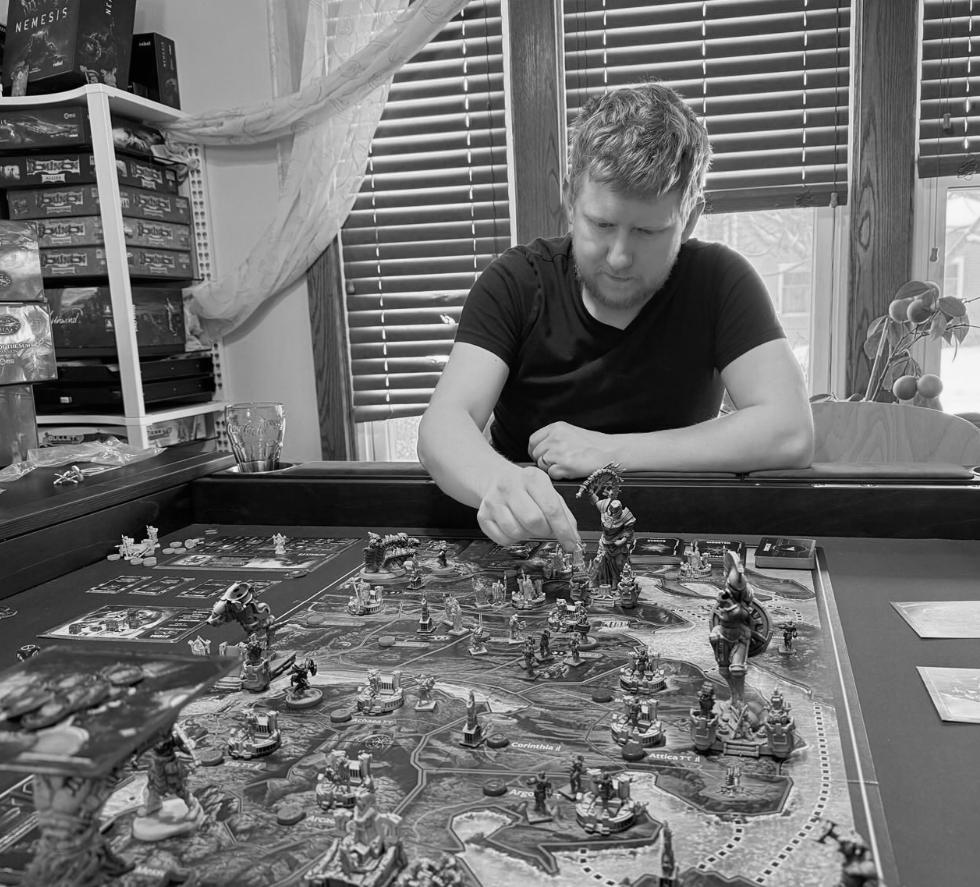

I’m married now, and so what I tend to listen to a lot with my wife is K-pop. K-pop is like a spectacle. If you’ve never seen K-pop, the music videos are very interesting. They’re colorful, and there’s all this dancing. If I had to pick one, it’s hard to do, but I would probably pick Stray Kids. Stray Kids is younger, and they’re pretty popular. The song hits pretty hard. We have dance parties now with my son where we will dance to K-pop with him, which mostly means hold him and kind of go up and down.

It’s a classic revenge story where this guy comes back and takes revenge on the people who wronged him and destroyed his life. It evokes a lot of philosophical questions about revenge because the people who really hurt him are living their best life in French society. Don’t watch the movie though because they change the ending in a way that I think is unsatisfying. I read it once when I was younger, and it was an abridged version that I didn’t realize until I was 80% through, and then I was sad. So I read the full version, and I was flying home. And I did and I scored a really good book!

I’ll probably just have to maybe date myself and say
“The Lord of The Rings.” You kind of have to watch the whole thing, but my favorite is probably “The Two Towers.” It’s the practical effects that they did. They also did a lot of costumes, and it really makes the movie real. It’s such a faithful adaptation. The good people struggle against overwhelming evil, and they do it through unlikely means. “Return of the King” finally won all the awards. “The Lord of the Rings” is probably the best adaptation of a written work into a movie.


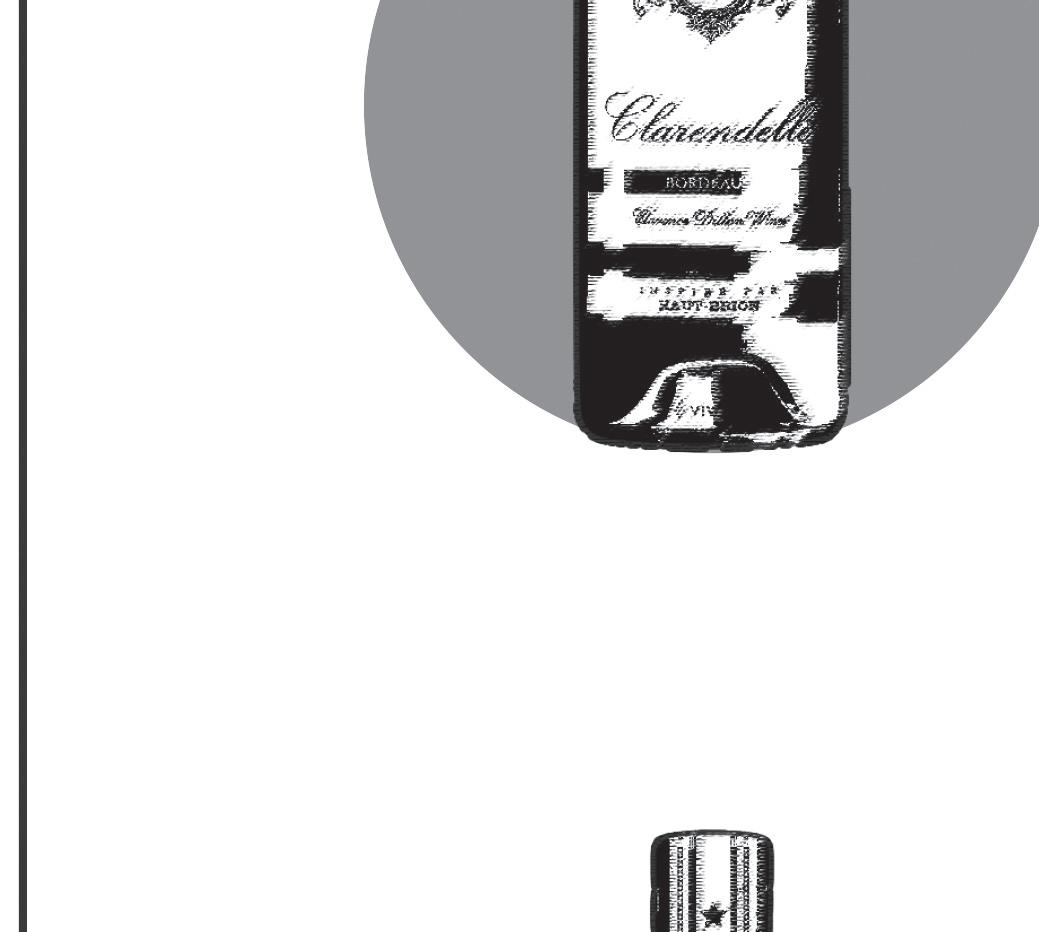
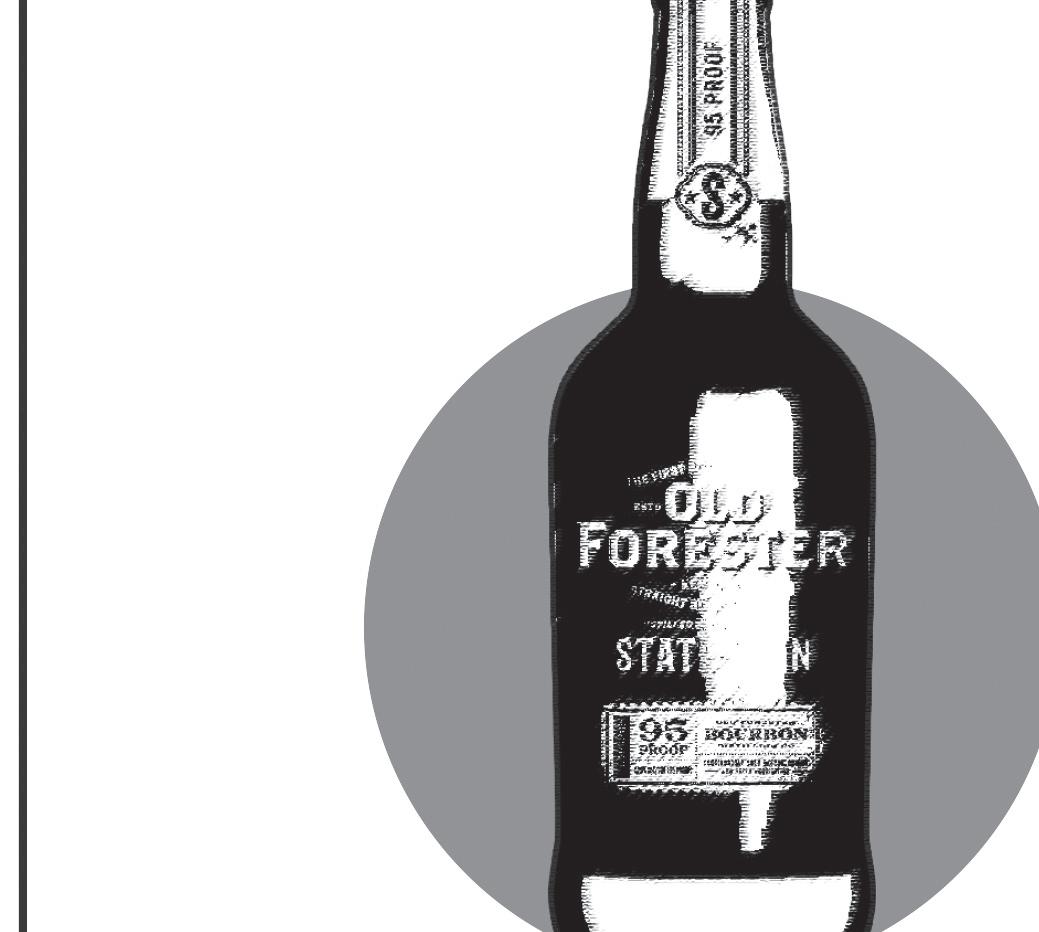
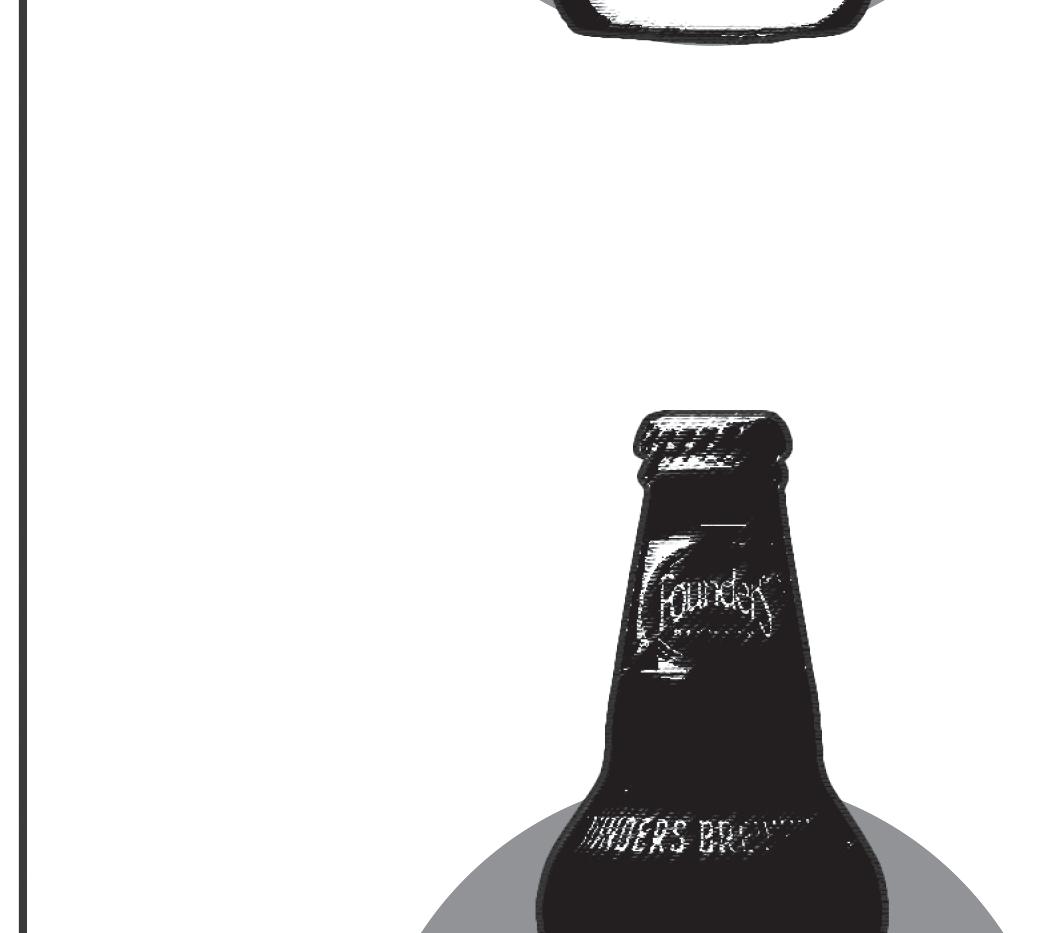










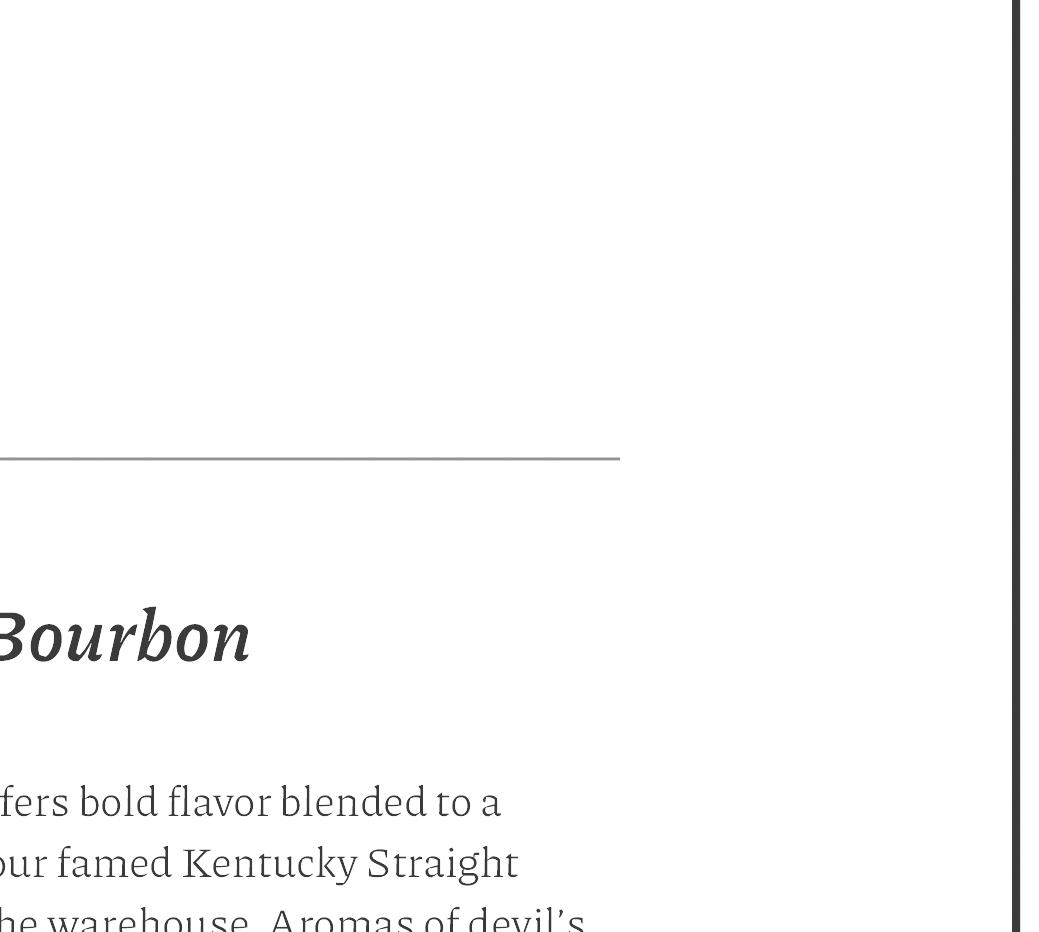


FEATURES

From swords to sneakers: Profs show o unique o ce decor
By Catherine Maxwell NEWS EDITOR
Stewart has a Lego set from a murder mystery, Lambert has a rst edition of T. S. Eliot, and Wolfram has an impala head. Every Hillsdale professor adds something to his or her o ce to personalize it, but some ofces stand out, thanks to their random assortment of collectibles and memorabilia.
Professor of History Dave Stewart’s o ce is a conglomerate of toys, class mementos, and historical artifacts. He’s arranged Lego sets throughout the room — Japanese architecture on a co ee table, Agatha Christie’s Orient Express in a glass case, and his own tinkerings on a bookshelf.
“The Orient Express was just a train, so I got all the people and made them to go with the book,” Stewart said.
All the sets connect to classes Stewart teaches.
“My son, for Christmas — because he knows I like the Far East, military history, and the 18th century — got me an 18th-century Japanese castle,” Stewart said.
He also builds his own Lego models, such as a model of the basement oor of Delp Hall,
which sits on a bookshelf surrounded by Lord of the Ringsthemed rubber ducks. So far, the model includes the o ces of Associate Professor of English Dutton Kearney and Assistant Professor of German Je rey Hertel.
Stewart said he plans to keep building, but he “gets distracted a lot.” His next step is to build Professor of History Kenneth Calvert’s o ce.
“I could build that, or there’s a million other things I could do,” he said. “ at’s as far as I’ve gotten with Dr. Calvert’s o ce: a little, angry Roman.”
Legos aren’t Stewart’s only toys. He has also “accidentally” collected more than 1,000 rubber ducks.
Stewart said the collection started about 15 years ago, when he was complaining to his mother-in-law that his childhood had been so hard, he “didn’t even get a rubber duck.”
“To me, it was just one of the many dumb things I say in passing,” he said. “ e next day, my mother-in-law and my wife went to Walmart to buy groceries and normal stuff. While she was there, she saw a rubber duck, and she thought of me, so she bought it. When I came home, she said, ‘Here,

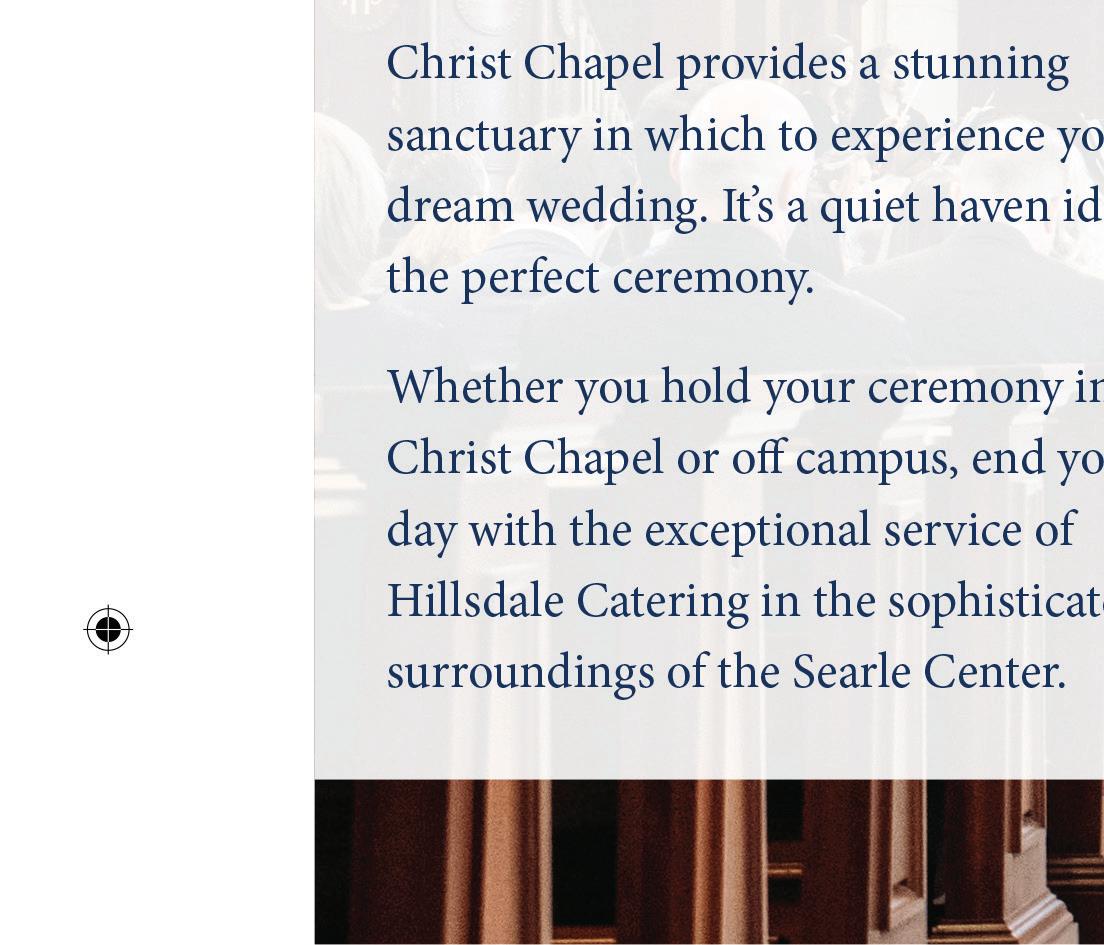
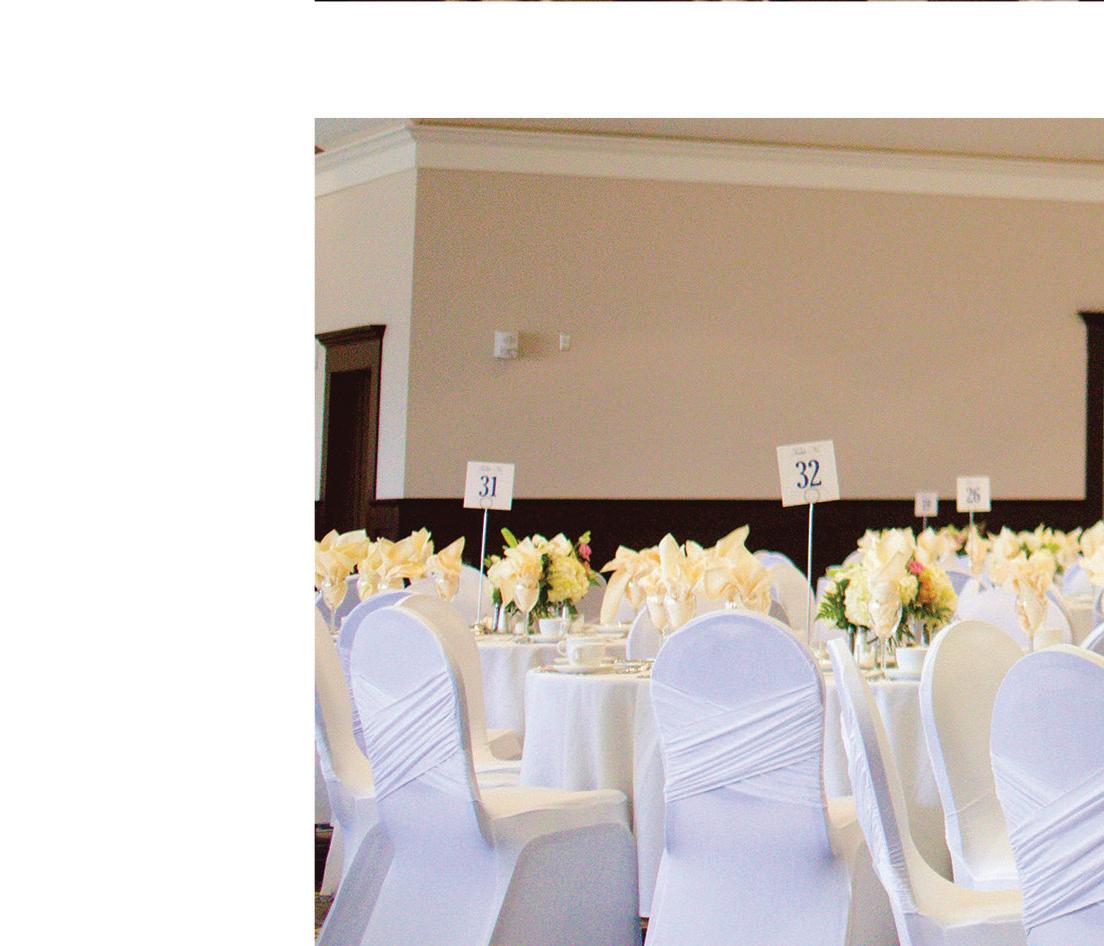
stop whining,’ and she gave me this classic, standard, yellow rubber ducky.”
Stewart said he took the duck to his o ce the next day and stuck it on his desk without much thought.
“After Christmas break, a couple of students said, ‘Your duck looks so lonely.’ ey had bought a couple of others and put them on the desk,” he said. “So then we had these three ducks sitting there on the corner of my desk. And then spring break, somebody went to Chicago and came back and said, ‘I saw this. And since you collect ducks, I thought you would want this to go with your other ones.’ And then it turns out that I collect ducks.”
Stewart said about half of the ducks come from students, and some come from family members. e Lord of the Rings ducks, which include members of the Fellowship, Sauron, and Saruman, came from Edward Gutiérrez, the former director of the Center for Military History and Strategy at Hillsdale College.
“ e rst year he was here for Christmas, he gave me half of the Fellowship, and then the next year, he gave me the other ones,” Stewart said. “He
thought I should have something responsible and reasonable. If I’m going to have nonsense, it should be responsible nonsense.”
Stewart has other toys — a plastic Marie Antoinette with a detachable head, a stuffed rabbit that squeals, “I love you,” and a small gnome he named a er Hillsdale College President Larry Arnn. But the favorite item in his o ce is a replica Spanish sword from his son.
“He joined the U.S. Army and served in Syria at a top secret base that Amazon delivers packages to,” Stewart said. “You get bonus pay when you’re in the army and you serve in a combat zone, so with his bonus pay, he contacted this guy in Toledo, who is, I think, a 16th-generation sword maker, and he commissioned that sword. It’s cool anyway, but that makes it cooler: it’s handforged by this guy whose family has been doing it for 600 years.”
The sword now hangs on Stewart’s wall framed by maps, one of which, Stewart said, could be from the 1760s.
See Offices B6


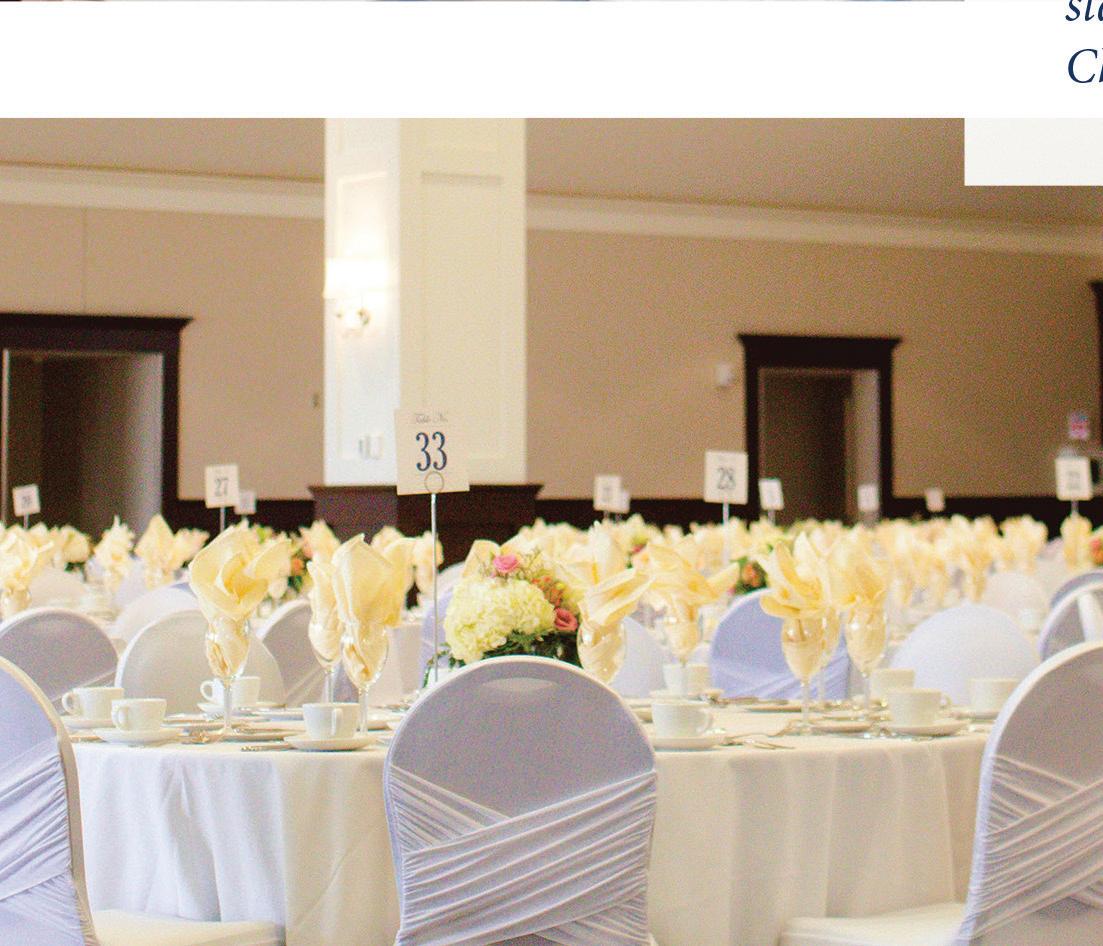



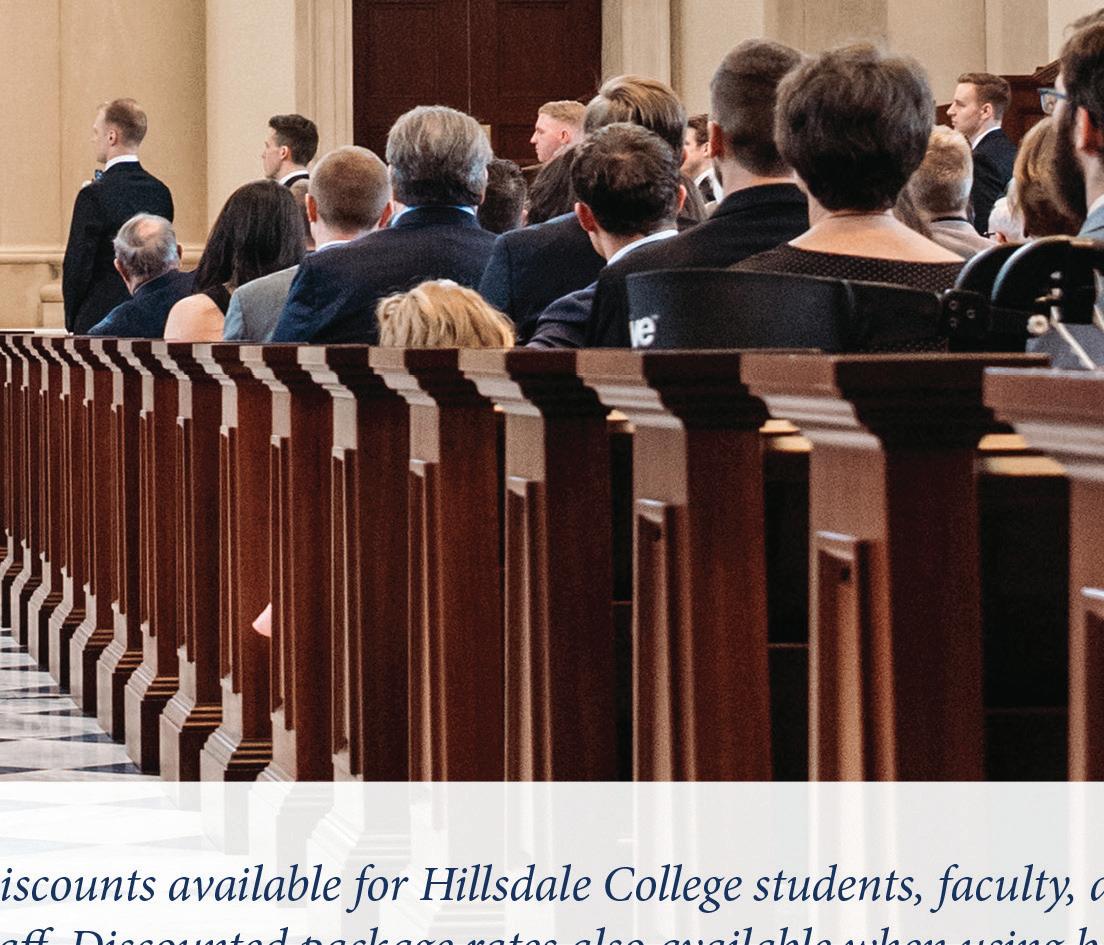


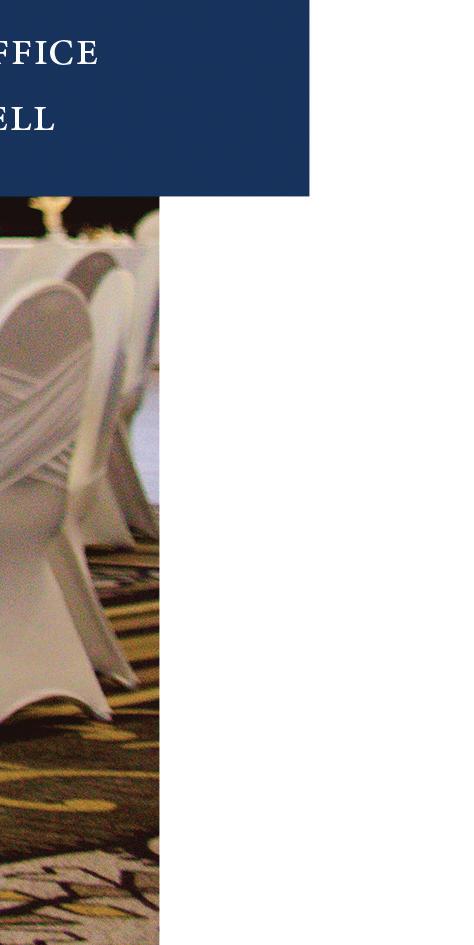
F E A T U R E S
Money talks: Econ brings real life to classroom
By Caroline Kurt OPINIONS EDITOR
When Robert Atra wanted to give his students real-world experience, he turned over half of his 401(k) to the investment club.
“They actually have well over $100,000 from just my 401(k) to manage,” said Atra, the chairman of economics, business, and accounting. “It’s a little more interesting if it’s someone’s money, as opposed to the college’s money, which in a sense becomes faceless.”
Other professors in the economics and businesses departments said they have developed similar experimental and interactive projects to make abstract concepts personal. ey said economics, as an experimental science, is primarily concerned with the human person, but students may forget this personal aspect when facing complex theories.
e investment club, which already managed a portion of Hillsdale’s endowment, added the portion of Atra’s 401(k) to its portfolio in 2023. Atra, the club’s adviser, said he thought students would benefit from reporting to a client — himself — and experiencing the limitations of 401(k) investing.
ics graduates. “Students go do all kinds of things, banking and real estate and whatever. But nancial advising, if I had to rank them, is probably number one. You have to change your class to re ect that orientation.”
Abel Winn, associate professor of economics, said he emphasizes the experimental nature of economics in his classes. In his principles of microeconomics and experimental economics courses in particular, Winn said he uses economics experiments to contextualize and drive lecture material.
“In my principles of microeconomics class, the rst experiment we do is the double auction,” Winn said.
Winn said he divides students into buyers and sellers, telling them their score depends on the pro t they can make trading in the market.
e highest earners earn extra credit on the nal exam. Sellers try to sell products for higher than the production cost, and buyers try to buy products for lower than the production cost.
phone. “ is smartphone does not have a value that is intrinsic to the object. Every person has their own preference for it and what they’d be willing to give up to get it.”
Winn argued that economics is an experimental science, and that seeing it as such reveals its beauty.
“I can build small worlds in the lab and test out what’s happening. at’s a really exciting thing,” Winn said. “It sparked some wonder for me. I’m hoping that it does that for my students in both of those classes.”
Winn also said having the memory of experiments gives economists better predictive abilities and more intellectual honesty.
“Practicing economics as an experimental science, at least for me, makes you a lot more humble,” Winn said. “I don’t have as much knowledge about my fellow man as I thought. I know a lot about myself, but I don’t know that much about these other people.”
“We’re storytelling and story-hearing creatures,” Martin said. “We’re not great at processing abstract thought without a way to humanize it or relate it to the interaction of real people.”
Martin said he hopes graduates of his classes emerge with an active concern for truth, and with the ability to articulate a vision of capitalism compatible with virtue.
“A lot of people think that economics is just about self-interest, which is a species of prudence,” Martin said. “I think it can also be about justice too and mercy in some respects. It’s very much, in my mind, not about ‘get rich by any means necessary.’”
Junior John Frenz described the impact of Martin’s creative pedagogy on his economics education.

with Korey Maas
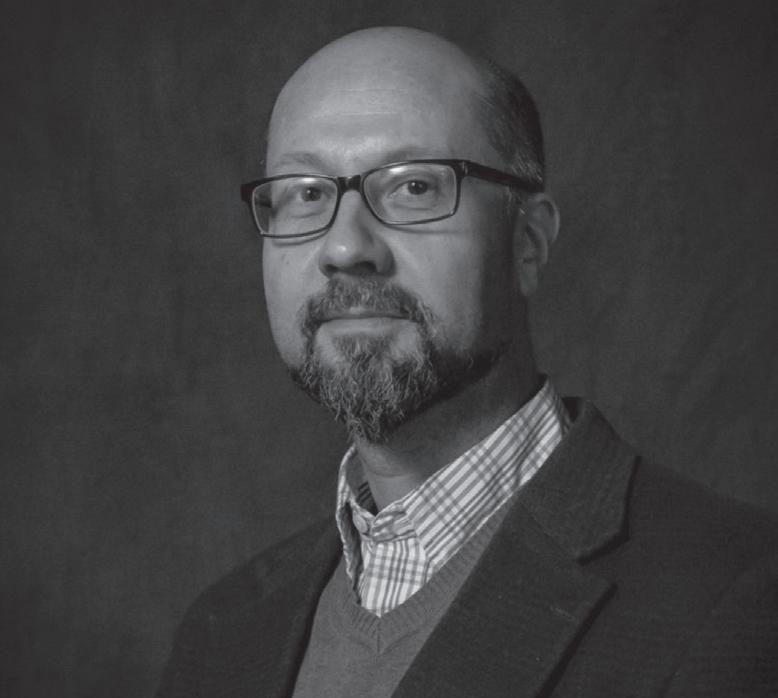
By Ty Ruddy ASSISTANT EDITOR
Associate Professor of History Dr. Korey Maas talks infested couches, home maintenance, and beer.
What period of history besides your specialty is most interesting to you?
It’s got to be late antiquity, with all the changes and controversies attending the Christianization of the Roman Empire.
What foreign language would you most like to know?
What is the most in uential animal in history? Horse for war, dog for hunting, something else?
My foreign languages were all grad school acquisitions for reading purposes and never got the spoken exercise they deserved, though I have fond memories of loafing around Spain with amusingly terrible phrasebook Spanish. But being able to speak French would be nice.
“I can build small worlds in the lab and test out what’s happening. at’s a really exciting thing. It sparked some wonder for me. I’m hoping that it does that for my students in both of those classes.”
“ e idea is to put them in a more realistic situation when it comes to making investment decisions,” Atra said.
According to Atra, the part of his 401(k) managed by student investors did about the same as the portion managed by a mutual fund company.
“ ey’re right on par,” Atra said.
Atra said he applies the same experimental attitude to his in-classroom teaching, as well as many other economics and nance courses. In the classroom, Atra said he likes to engage students through projects.
“I frequently write the projects in terms of a memo from your boss,” Atra said.
Atra said memos give students a better idea of how to apply economics in the professional sphere, while emphasizing concision and problem-solving.
“We are sending a lot of people to nancial advisers,” Atra said of Hillsdale econom-
“When one buyer and seller have reached an agreement on a price, that’s a contract,” Winn said.
Following the experiment, Winn creates a graph of the sellers’ and buyers’ values, creating real-life supply and demand curves. Students conduct different rounds of the experiment to mimic shortages and price controls.
“Going into the experiment, I know what the equilibrium prediction is,” Winn said. “ ey have no idea what the equilibrium price is. ey just trade.”
Winn conducts a di erent demonstration to help his students understand subjective valuation and gains through trade. He distributes small items to the class and has them trade them according to their preferences.
“When we trade with each other, both of us end up more satis ed with what we have at the end of the trade than what we had beforehand,” Winn said, picking up his smart-
Christopher Martin, associate professor of economics, said he has evolved his teaching techniques to meet the diligence and intellectual initiative of his Hillsdale students, frequently incorporating interactive moments like skits into his classes.
“I had a student play the role of employees and had another student play the role of a hiring rm to think about the marginal productivity theory of wages,” Martin said. “I had students take turns stepping on a chair to indicate diminishing marginal returns to labor.”
According to Martin, the technical aspects of the exercise are of less importance than developing intuition.
“ e point is to have students see a visual of a concept,” Martin said. “My general instinct is that sitting and listening passively for a long time is hard for us as human beings. Even with the best of will, our attention ags.”
Martin’s theory, which he said he drew from his own mentors, is that periodic breaks or shifts reinvigorate students’ capacity for attention.
“By far the most interesting, in my opinion, of his teaching devices is a bag of plastic gold coins that he has, which are now worn from usage,” Frenz said. “Dr. Martin uses them often during teaching days that involve complex nancial situations. ese can be banking crises, nancial schemes, historical collapse, etc.”
According to Frenz, the tangible coins help students visualize di cult concepts.
“Using them, alongside accompanying charts on the board and commentary from Dr. Martin, students are able to observe in real time the movements of money, how it changes hands in complex banking transactions, how human error or trickery can manipulate the monetary system, and how trade works amongst nations and people,” Frenz said.
Senior Sarah Katherine Sisk said studying economics at Hillsdale was the second best academic decision of her life so far, following only her decision to attend Hillsdale.
“Hillsdale definitely has some of the best economics professors in the world,” Sisk said. “Through all of their classes, you’ll learn that economics is fundamentally about people, so it makes sense that all of the economics professors care so deeply for their students’ academic and personal formation.
Setting aside man, because that’s just too easy, I’d probably go with domesticated cattle for positive in uence, and the ea for negative.
What is one fun memory you have from your time at Oxford?
Not so much fun as funny, at least in hindsight. Early in our time there, my wife and I invited my doctoral adviser over for dinner. We were grad-school poor, and the cinder block walls and spartan furniture of our university housing gave it a denite jailhouse vibe. So we were pretty ecstatic, two days before the dinner, to discover a perfectly good sofa sticking out of a neighborhood dumpster. We rescued it under cover of darkness, and gave it pride of place in the apartment. When I came home the next day, there was a sign posted by the elevator: “Whoever took the sofa from the skip, return it immediately. It is infested and not to be reused.”
We never discovered what, exactly, was infesting it; but needless to say we thought better of letting my adviser nd out the hard way. So we wrestled the sofa back out and entertained in the again dreary prison cell.
A coda, though: A year later, I was invited to take up a ministerial position in Cambridge, but was a bit nervous about asking my adviser’s approval to do so while still working on the degree. When I screwed up the nerve to ask, he didn’t hesitate before saying, “God, yes, by all means get out of that awful at!”
What is the most historically accurate work of ction you’ve ever come across?
If I said James Ellroy’s “L.A. Quartet” I’d sound like a conspiracy theorist, so let’s say Robert Harris’ “Imperium.” I don’t know that it’s actually the most historically accurate novel I’ve read (i.e., don’t @ me, classics department), but it comes to mind as the most recent.
If you could teach any other subject, what would it be?
I previously taught for a decade in a theology faculty, so that would be the natural choice.
What are your hobbies?
Fixer-upper stu . We own an 1840s home on a small acreage, so a fair amount of free time is devoted to maintenance, repair, and improvement of the property. ankfully, it’s something I enjoy doing. I’m not good at it, but I enjoy doing it.
English or American food?
American, hands down – with the exception of the full English breakfast. And, of course, the beer.
Give a quote that sticks with you.
Nunc est bibendum. (Translation: “Now is the time to drink.”)
Professors ponder how to celebrate Presidents’ Day
By Gemma Flores COLLEGIAN REPORTER
George Washington was not a fan of glorifying his presidency, according to Assistant Professor of Politics Daniel O’Toole.
“Washington didn’t want the president to be a kind of omnipresent force in American political life,” O’Toole said.
“There’s something perverse about the fact that, in America, we hang on to every word the president speaks.”
Washington’s humility is one of the reasons why, on the third Monday of every February, Americans celebrate Presidents’ Day.
Yet here at Hillsdale, this opportunity to celebrate American presidents on Monday Feb. 17 slipped through the cracks. Even here, on a campus that takes pride in the American founders, few people took the time to celebrate Presidents’ Day.
“It’s kind of become a nonevent in American life,” said
O’Toole.
In 1885, Congress originally designated Feb. 22 as Presidents’ Day to honor George Washington’s birthday, according to the National Archives. is marked the rst American holiday in commemoration of an individual’s birthday. Washington governed the country through its early days, which is why he is consistently considered the country’s best president, according to Associate Professor of Politics Khalil Habib.
“George Washington understood the character of the nation and its principles,” Habib said. “He recognized that the commander-in-chief must be both a leader and a citizen and that he must govern by example.”
e Uniform Monday Holiday Law of 1971, geared towards giving workers more long weekends, changed the date to the third Monday in February. Since then, Presidents’ Day has grown from simply recognizing George Washington’s birthday
to honoring many American presidents with a particular emphasis on Washington and Abraham Lincoln, who was also born in February.
“Both Washington and Lincoln had a very clear conception of what government is, what morality – what political morality – is, what the government should be doing and what it shouldn’t be doing,” O’Toole said.
A 2023 New York Times opinion piece entitled “George Washington Would Hate Presidents’ Day” raises objections to the celebration of Presidents Day citing Washington’s own view of the o ce.
Historian Alexis Coe believes Presidents’ Day has become indicative of a party system that is out of touch with its constituents. Coe says in her article that, with a shi to focusing on the president as a public servant rather than a deity, the holiday would take on more meaning.
“Presidents’ Day has the potential to issue a yearly remind-
er about this if it undergoes a substantial shift in focus. It cannot be about one president – who will be just ne no matter what. Washington can’t be canceled,” writes Coe. “If you erase Washington, you erase America. But a national gurehead? We will never agree on one, and without agreement, there is no meaning.”
While Presidents’ Day is a signi cant holiday in our nation’s history, many Hillsdale professors say that the misunderstanding about the holiday’s meaning has muddled its importance.
“We have all these vaguely patriotic holidays. People don’t even know what they mean,” O’Toole said. “It would be better not just to have a vague patriotism, but to celebrate that older way of life and its heroes. In other words, put some real esh on the bones, something really concrete to celebrate.”
For O’Toole, Presidents’ Day should celebrate America’s founding and the storied history of its government. O’Toole
said he believes that the emphasis on modern-day heroes like Martin Luther King and President Franklin Roosevelt o en displaces the importance of America’s founders.
“Partly to talk about Presidents’ Day is to celebrate the older Republic. To celebrate its heroes, its conception and its way of life as opposed to the leaders of the modern way of life,” said O’Toole. “ ere’s a reason why the Kings and the Roosevelts have displaced Washington and Lincoln in our political pantheon. at’s about foisting a new rival regime on us.”
Professor of History Bradley Birzer emphasized Washington’s disdain for glorifying the president. Rather than Presidents’ Day, Birzer said Americans should focus on remembering Washington. For Birzer, remembering Washington means remembering his life and work, something Hillsdale students do already as part of their studies.
“I just think we need to put
Presidents’ Day in proper perspective,” Birzer said. Rather than letting the day pass by, Habib said students should re ect on the legacy of the American founders and the government they built from the ground up.
“I think it is more important to study the Founding and examples of great statesmanship and partake in local government rather than take a day o in honor of Presidents’ Day,” Habib said. It’s also a time to re ect on where the country is headed. According to O’Toole, looking at the past pillars of the American government is a good place to start.
“Washington and Lincoln –they’re the model. at’s what we need to be looking to, and it’s worth celebrating them as heroes,” O’Toole said. “And so if you want to recover that truer, freer, superior way of life, you should recover your heroes too.”


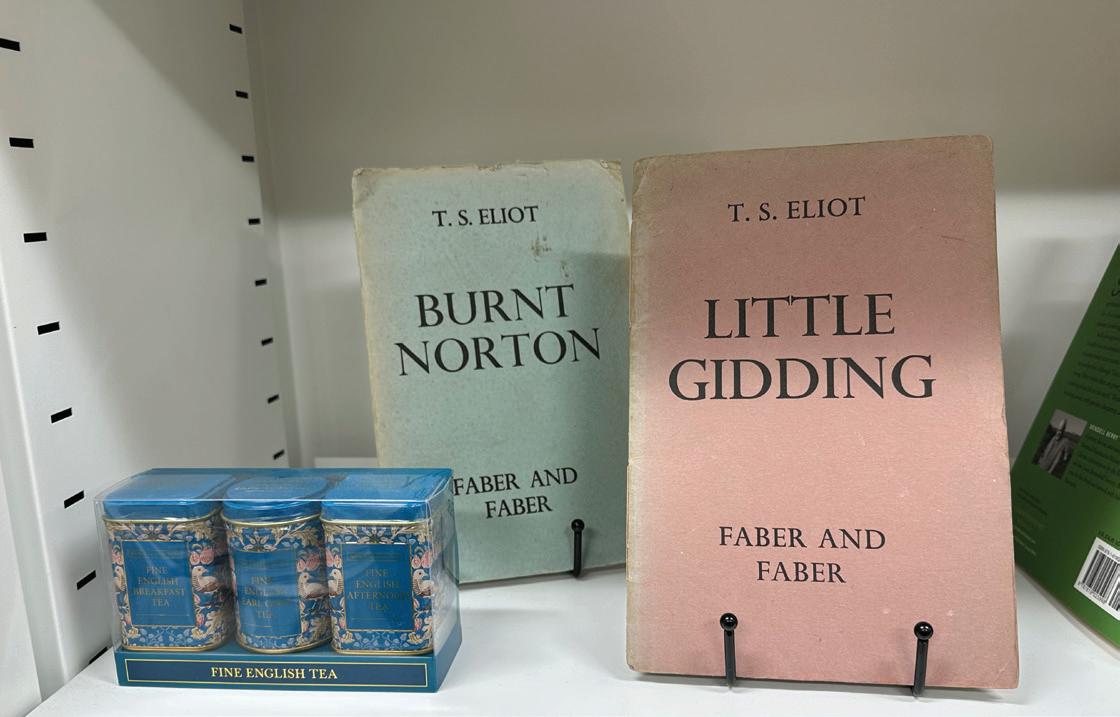


Offices from B4
Instead of decorating with swords and Legos, Assistant Professor of English Christina Lambert displays art prints, many of which are souvenirs.
“It’s such a great way to revisit places and have them in your landscape all the time,” Lambert said.
Lambert said collecting art began with photographs.
“I love these places, and I’d love to have them around me,” she said.
Three of her favorite photos sit on top of her bookshelf. The earliest image is a picture she took in Antalya, Turkey while on the Hillsdale College Honors Program (now called the Collegiate Scholars Program) trip her junior year of college; the other two are of Interlaken, Switzerland and Gordes, France.
Lambert also displays a photo from photographer Jamie Beck, who captured a series of still flowers every day during the COVID-19 lockdowns.
“It’s a very nice, artistic rendering of a time period that was tough,” Lambert said. “This is a nice way of memorializing it.”
Lambert collects and displays paintings as well as photographs.
“I was raised going to art museums, so now when I go, I love to collect a piece that really struck me,” she said.
One art print is of Claude Monet’s “The Seine at Giverny,” which Lambert said she saw while on a college trip to the Art Institute of Chicago.
“He’s looking at the mist on the water,” Lambert said. “I remember going with my friends and being really struck by it.”
Another Monet on Lambert’s wall comes from the “Water Lilies” display at the Musée de l’Orangerie in Paris, France. The long, rectangular print hangs above Lambert’s desk.
“It’s the most striking museum experience you’ve ever had, because they’re just
huge,” Lambert said. “The walls are all these big oval rooms, and the paintings wrap around the walls, and you could be in there for the entire day, just like soaking in this 3D experience of the water lilies. My mom and I went a couple years back, and we both needed something to represent the largeness of it and experiencing it immersively.”
Lambert also displays her favorite icon, depicting the harrowing of hell, above her desk, as well as an 1899 reprint of Jane Austen’s “Persuasion.” The book originally released in December 1817.
“Some friends of mine got it for me,” she said. “The book was falling apart, and I didn’t know I was like, I want to be careful with it. So I sent it to get framed, and now it’s one of my favorite things in the room.”
Although she loves “Persuasion,” Lambert said her favorite piece is a Faber & Faber Christmas card print of T. S. Eliot’s “Marina,” a poem commenting on Shakespeare’s “Pericles.” In the print series, Faber paired a poet with a modern artist.
“I love this crazy, modernist art on the front cover, which you would not necessarily immediately associate with Eliot, but he was thrilled to work with this artist,” Lambert said. “It’s something you would send, and you would reflect on this modernist art and then the poem itself.”
She also has first edition copies of “Burnt Norton” and ‘Little Gidding,’ the first and last poems in Eliot’s “Four Quartets” respectively. The poems were printed as thin paperbacks.
“If this was just a piece of paper that you got in the 1940s, you would be able to put this in your purse and carry it around in your bag and read it on the tube,” Lambert said. “Eliot is famously inaccessible, but I think the mediums teach us about a different Eliot that would be in the hands of people and they could read it on the go, reread
it, and re-engage with it. It’s not all annotations and scholarly work. It’s people opening up ‘Little Gidding’ and just reading a poem over and over and over again.”
Like Lambert, the office of Gary Wolfram, professor of political economy, encapsulates some of his favorite things. But instead of paintings and literature, his office features hunting, running, and Westerns.
Wolfram mounted an assortment of hunting trophies above his door. The two heads belong to an impala he shot in South Africa and a deer he killed with a bow.
“I have a crossbow and a regular bow, and I used to also shoot with a rifle,” Wolfram said.
Wolfram also displays running memorabilia throughout his office. His track jersey from University of California, Santa Barbara, now more than 50 years old, hangs from a bookshelf.
“It still has dirt stains on it, because we used to run on dirt tracks back then,” Wolfram said.
Wolfram has shirts from past races, too, including the 1977 Boston Marathon. He said the Boston Marathon is one of his favorite races he’s run.
“In those days, it was all amateur, but Nike could give me my shoes and could pay for my expenses to go to run the Boston Marathon,” Wolfram said.
He said he finished the marathon “near the front” in 14th or 15th place.
Wooden plaques from the Michigan Trail Marathon hang above one bookshelf.
“I won the first seven of the Michigan Trail marathons,” Wolfram said.
In addition to his own running memorabilia, Wolfram also has the spikes of Henry Rono, a Kenyan long-distance runner who broke four world records in 1981.
“Henry Rono broke the world record in those spikes,” Wolfram said.
Wolfram also has a photo-
Previous record holders also attended Washington State.
“I was training with them,” Wolfram said. “I was trying to qualify for the Olympic trials in the marathon, and I missed it by one minute, both in 1980 and 1984.”
Another of Wolfram’s favorite pastimes is watching Westerns, and his Western-themed decor ranges from movie posters to photos to a cowboy lamp.
One autographed photo is of Roy Rogers: a singer, actor, and rodeo performer who starred in about 90 movies from the 1930s–1950s.
“It’s signed because my aunt was on his bowling team,” Wolfram said.
Wolfram also has signatures from “The Life and Legend of Wyatt Earp” star Hugh O’Brian and country singers Garth Brooks and Clint Black.
“I named my son Wyatt after Wyatt Earp,” Wolfram said.
A poster of Wolfram’s favorite Western, “The Good, the Bad, and the Ugly,” hangs on the back wall of his office.
“There’s a three way gun fight in it, and I use that in my game theory part of my public choice class,” Wolfram said.
Wolfram also displays a jar of ashes from Mt. St. Helen, a floor-to-ceiling shelf filled with signed books, including autographs from economists Milton and Rose Friedman, and his undergraduate diploma signed by then-California Gov. Ronald Reagan. Under his desk sits another Western-style poster of Reagan facing off against Leonid Brezhnev, general secretary of the Communist Party of the Soviet Union from 1964–1982.
“There was a movie called ‘Bedtime for Bonzo,’ and they restructured it so it was ‘Bedtime for Brezhnev,’” Wolfram said.

